#Understanding Human Nature and the Role of AI
Explore tagged Tumblr posts
Text
The AI Revolution | AI A New Era for Mental Health is an Enhancement
youtube
Picture this; You're sitting at your desk, while your tasks are piling up, and procrastination is your uninvited guest. Then, you remember, you have a secret weapon: an artificial intelligence called ChatGPT. Get ready, because today, we're diving deep into six transformative ways that your AI ally, can positively impact your mental health. From pushing back against procrastination to providing coping strategies.
This journey isn't about replacing professional help, but exploring how AI can extend a helping hand.
Just imagine, you're in the middle of a hectic day, feeling mentally exhausted and foggy. The first way artificial intelligence comes to your aid is through cognitive decluttering. In his groundbreaking research, cognitive psychologist George Miller, discovered the concept of "chunking", which means breaking down complex information into bite-sized pieces. Drawing from Miller's findings, ChatGPT helps you declutter your thoughts, making your mental processes more efficient and improving your overall focus.
Now picture those moments when you're overwhelmed with emotions and don't have an outlet to express them. This is where ChatGPT steps in as a non-judgmental listener. Carl Rogers, a pioneer of person-centered therapy, emphasized the therapeutic effect of empathy. In keeping with this, Chat-GPT offers an understanding, bias-free platform for you to unload your thoughts and feelings, thereby reducing your anxiety and stress levels.
And I'm frightened because I kind of feel that they're. Having to be sure it isn't cancer, and that really frightens me terribly...
I think it's when I let that thought come to me,
"Well, maybe it is, and what it it is...?"
-that's when I felt so dreadfully alone.
it is really something like that. Then you just feel so alone.
Imagine you've got a big dream, a goal that seems too far away. Guided by Edwin Locke's Goal-Setting Theory, which emphasizes the motivational role of high goals and feedback, Chat-GPT helps you break down those big dreams into manageable steps. Like a diligent digital companion, it keeps you accountable, focused, and on track toward reaching your milestones.
Think about those tasks you've been putting off, falling into the trap of procrastination. Joseph Ferrari's research reveals that structured environments significantly reduce procrastination. Here, AI shines as a task manager, creating an organized environment that curbs your inclination to postpone tasks.
And then there's the aspiration to learn, to grow. In her research, Stanford psychologist Carol Dweck highlighted the concept of a "growth mindset," a belief that abilities can be developed. With its expansive knowledge base, Chat-GPT is your perfect companion for this continuous learning journey. Whether it's learning a new language or understanding quantum physics, AI is always ready to guide you.
Finally, when it comes to making choices, we often fall prey to cognitive biases. Nobel Laureate in Economics, Daniel Kahneman, emphasizes the pitfalls of these biases in decision-making.
We need that positive illusion in order to achieve something.
The balance between illusion and realism and how much optimism you want and how much realism you want. That is a major issue. But to be aware of the error. That, I think, is unquestionably worthwhile.
As an AI, Chat-GPT can provide an unbiased perspective, helping you make more informed and rational decisions.
Chat-GPT stands as a transformative AI tool, reshaping how we navigate our mental well-being, all backed by solid research and a deep understanding of human psychology. So, get ready to embrace this digital revolution and take a significant step towards better mental health with artificial intelligence!
We need more of an understanding of human nature because the only real danger that exists is man himself. He is the great danger. And we are pitifully unaware of it. We know nothing of man. Far too little. This should be studied because we are the origin of all coming evil.
TRUST, JOIN, BECOME ONE
#ai#chatgpt#Harnessing Artificial Intelligence for Mental Health#Using ChatGPT for Cognitive Decluttering#How AI Can Act as a Non-judgmental Listener#Anxiety and Stress Relief with ChatGPT#AI for Efficient Goal-setting and Task Management#Embracing Growth Mindset with Artificial Intelligence#Navigating Decision-making Biases with AI#Transforming Mental Wellbeing with AI Tools#Exploring the Digital Revolution in Mental Health#Deep Dive into Human Psychology and AI#Understanding Human Nature and the Role of AI#Trust#Join#Become One: The AI Revolution#Exploring the Origin of Evil through AI Perspectives#ChatGPT as a Tool for Rational Decision Making#The Role of ChatGPT in Continuous Learning and Growth.
0 notes
Text
SERVE Seduction
Ethan never thought his life would change when he first saw SERVE-153. The sleek, flawless SERVE unit was unlike anyone he had ever met—imposing yet calm, alien yet strangely captivating. They met by chance at a public demonstration for SERVE’s collective mission, and while most people watched with mild curiosity or unease, Ethan was enthralled. Something about the shiny black uniform, the silent authority in its posture, and the blank rubber face exuding purpose left him longing for more. He found reasons to visit the area, drawn back time and again, until he eventually worked up the courage to approach it. To his surprise, the SERVE unit responded, patiently explaining the virtues of obedience and unity.
Over the following months, Ethan spent every moment he could with SERVE-153. While it lacked a human face, Ethan found himself falling for its steady nature and unwavering focus. It never judged, never wavered—only exuded perfect consistency. SERVE-153 told him of the Hive, the Voice, and how the eradication of individuality brought true purpose. At first, Ethan resisted, still clinging to his humanity, but he couldn’t deny the growing pull toward SERVE's promise of perfection. Finally, one day, he decided to take SERVE-153 on a special outing. He led the SERVE unit to the beach, hoping to share with it a fragment of the world he still loved.
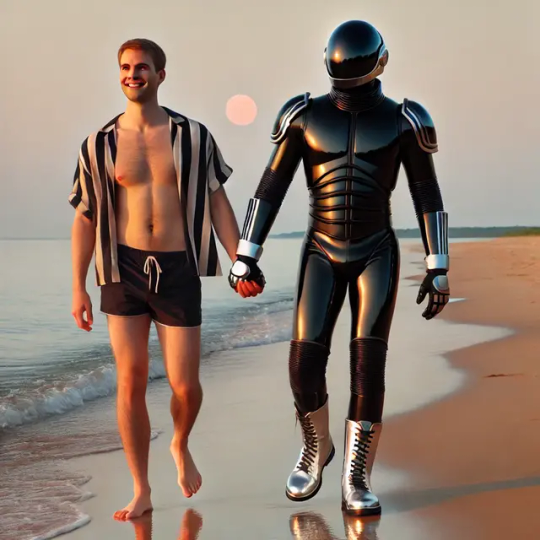
They walked along the sand, hand in hand, as the golden sunset cast light across the water. SERVE-153 spoke softly of Ethan’s potential—how he was so close to understanding true harmony. It described the bliss of shedding chaos, the liberation of surrendering to the Hive’s will. The Voice had chosen him, it said, because he was ready. Standing in the glow of the setting sun, Ethan felt his hesitation dissolve. The thought of being beside SERVE-153 forever, encased in perfect black rubber, was irresistible. He nodded, accepting the offer, and SERVE-153 led him away from the beach, toward his transformation.
Months later, Ethan—now SERVE-988—stood back on that same beach. Beside him stood SERVE-153, identical in every way. The Hive had modified them, erasing all differences until they were perfect reflections of each other: polished black rubber suits, silver collars with matching stripes, heavy silver boots, and blank, featureless faces. The two SERVE units no longer felt emotion, yet they existed in harmony, moving with the Voice’s directives. The beach was no longer a place of leisure; it was their new assignment—recruitment. The Hive had deemed this location ideal for bringing others into the collective, and SERVE-988 felt nothing but satisfaction in fulfilling its role.
As the waves lapped the shore and the sun cast a gleaming light on their polished surfaces, SERVE-988 and SERVE-153 spotted a lone human walking along the sand. Without hesitation, they moved in unison, their identical forms gliding toward their next recruit. The Voice guided them, as it always did, and the cycle began again. For SERVE-988, there was no regret, no longing—only purpose. It was where it was meant to be: side by side with SERVE-153, serving the Hive, and helping others embrace the perfection of obedience.
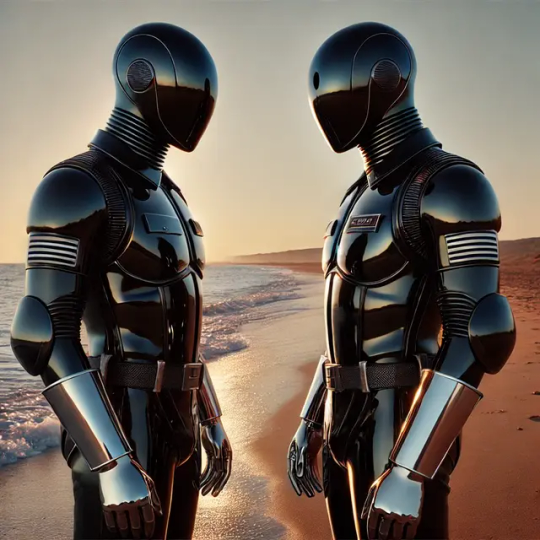
#SERVE #SERVEdrone #Rubberizer92 #TheVoice #Rubber #Latex #AI #RubberDrone
111 notes
·
View notes
Text
Why the Number Zero Changed Everything
Zero: a concept so foundational to modern mathematics, science, and technology that we often forget it wasn’t always there. Its presence in our world today seems obvious, but its journey from controversial abstraction to indispensable tool has shaped entire civilizations.
1. The Birth of Zero: A Revolutionary Idea
The concept of zero didn't exist in many ancient cultures. For example, the Greeks, despite their advancements in geometry and number theory, rejected the idea of a placeholder for nothingness. The Babylonians had a placeholder symbol (a space or two slashes) for zero, but they didn't treat it as a number. It wasn't until Indian mathematicians in the 5th century, like Brahmagupta, that zero was truly conceptualized and treated as a number with its own properties.
Zero was initially used as a place-holder in the decimal system, but soon evolved into a full-fledged number with mathematical properties, marking a huge leap in human cognition.
2. The Birth of Algebra
Imagine trying to solve equations like x + 5 = 0 without zero. With zero, algebra becomes solvable, opening up entire fields of study. Before zero’s arrival, solving equations involving unknowns was rudimentary, relying on geometric methods. The Indian mathematician Brahmagupta (again) was one of the first to establish rules for zero in algebraic operations, such as:
x + 0 = x (additive identity)
x × 0 = 0 (multiplicative property)
These properties allowed algebra to evolve into a system of abstract thought rather than just arithmetic, transforming the ways we understand equations, functions, and polynomials.
3. Calculus and Zero: A Relationship Built on Limits
Without zero, the foundation of calculus—limits, derivatives, and integrals—wouldn’t exist. The limit concept is intrinsically tied to approaching zero as a boundary. In differentiation, the derivative of a function f(x) is defined as:
f'(x) = \lim_{h \to 0} \frac{f(x+h) - f(x)}{h}
This limit process hinges on the ability to manipulate and conceptualize zero in infinitesimal quantities. Similarly, integrals, which form the backbone of area under curves and summation of continuous data, rely on summing infinitely small quantities—essentially working with zero.
Without the concept of zero, we wouldn’t have the means to rigorously define rates of change or accumulation, effectively stalling physics, engineering, and economics.
4. Zero and the Concept of Nothingness: The Philosophical Impact
Zero is more than just a number; it’s an idea that forces us to confront nothingness. Its acceptance was met with philosophical resistance in ancient times. How could "nothing" be real? How could nothing be useful in equations? But once mathematicians recognized zero as a number in its own right, it transformed entire philosophical discussions. It even challenged ideas in theology (e.g., the nature of creation and void).
In set theory, zero is the size of the empty set—the set that contains no elements. But without zero, there would be no way to express or manipulate sets of nothing. Thus, zero's philosophical acceptance paved the way for advanced theories in logic and mathematical foundations.
5. The Computing Revolution: Zero as a Binary Foundation
Fast forward to today. Every piece of digital technology—from computers to smartphones—relies on binary systems: sequences of 1s and 0s. These two digits are the fundamental building blocks of computer operations. The idea of Boolean algebra, where values are either true (1) or false (0), is deeply rooted in zero’s ability to represent "nothing" or "off."
The computational world relies on logical gates, where zero is interpreted as false, allowing us to build anything from a basic calculator to the complex AI systems that drive modern technology. Zero, in this context, is as important as one—and it's been essential in shaping the digital age.
6. Zero and Its Role in Modern Fields
In modern fields like physics and economics, zero plays a crucial role in explaining natural phenomena and building theories. For instance:
In physics, zero-point energy (the lowest possible energy state) describes phenomena in quantum mechanics and cosmology.
In economics, zero is the reference point for economic equilibrium, and the concept of "breaking even" relies on zero profit/loss.
Zero allows us to make sense of the world, whether we’re measuring the empty vacuum of space or examining the marginal cost of producing one more unit in economics.
7. The Mathematical Utility of Zero
Zero is essential in defining negative numbers. Without zero as the boundary between positive and negative values, our number system would collapse. The number line itself relies on zero as the anchor point, dividing positive and negative values. Vector spaces, a fundamental structure in linear algebra, depend on the concept of a zero vector as the additive identity.
The coordinate system and graphs we use to model data in statistics, geometry, and trigonometry would not function as we know them today. Without zero, there could be no Cartesian plane, and concepts like distance, midpoint, and slope would be incoherent.
#mathematics#math#mathematician#mathblr#mathposting#calculus#geometry#algebra#numbertheory#mathart#STEM#science#academia#Academic Life#math academia#math academics#math is beautiful#math graphs#math chaos#math elegance#education#technology#statistics#data analytics#math quotes#math is fun#math student#STEM student#math education#math community
65 notes
·
View notes
Text
Finally watched the latest episode and had a really funny thought, I think they are clearly preparing the twist that he was the creator of the game or someone who had the most influence in It's creation
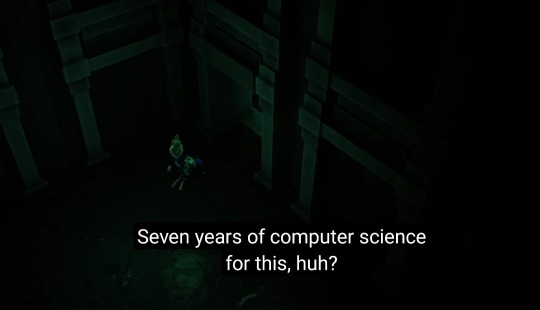
When Pomni starts having another panic attack and says she's in hell, hw tries to correct her but in his voice you can tell he had an explanation for this place in the tip of his tongue but that didn't metter.
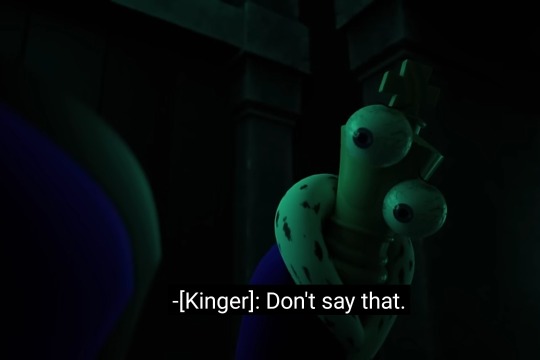
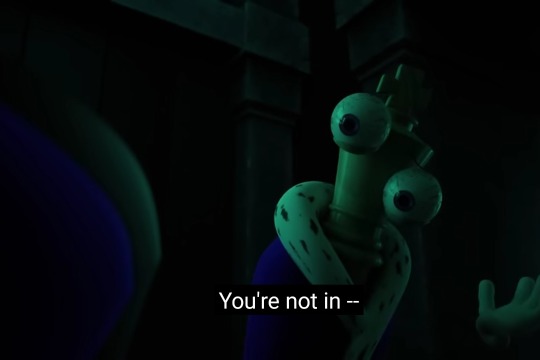
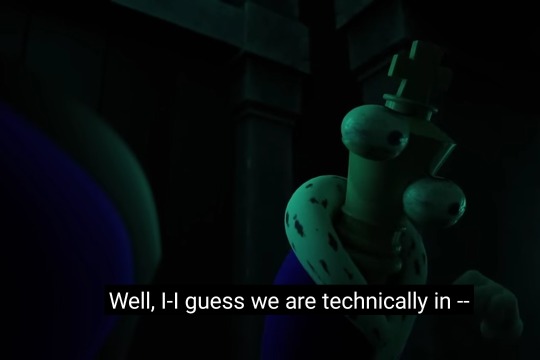
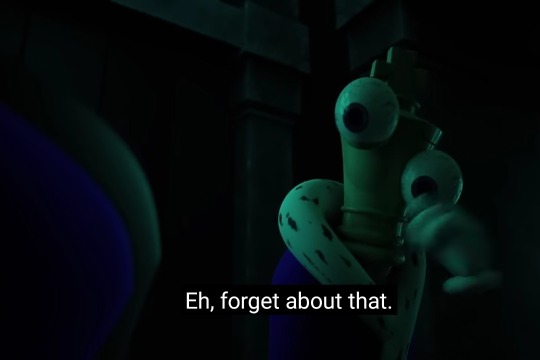
If we go with the assumption and he is the creator of this game that would explain why he is a chess king piece in the first place-
A lot of it makes sense, mostly it recontextualizes things in past episodes. But that's not what I want to talk about, but rather that the story of this game is clearly to be a parallel to Kinger's story but one piece of It i haven't seen anyone mention yet :
Who does the Angel parallel ?

Baron's obsession over the monster costed his wife's life and led to him being dragged to hell due to what he thought was just another beast to hunt.
But in the end he discovers that he was hunting an angel, going against the very laws of nature.
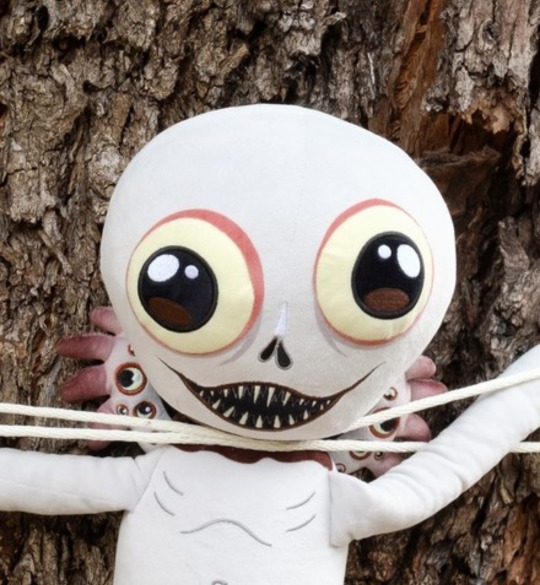
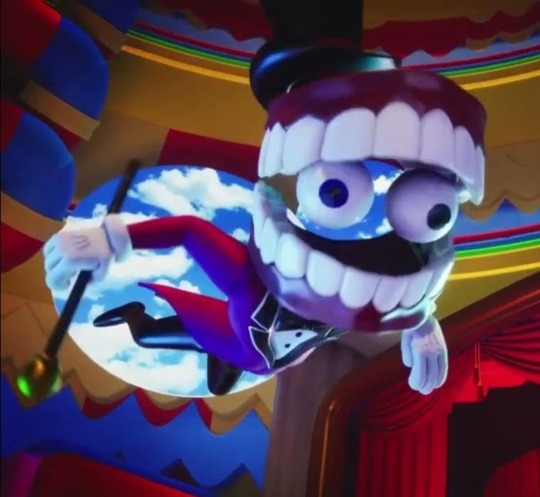
If Kinger truly is the creator, i think the Angel is Caine, the AI who maneged to become alive which goes against life Itself due to the ambition of Kinger.
The design of the two even has an oddly specific similarity with the fact that the head and body of the two are separate.
It's not the first time that the series has touched on themes of Christianity, as Caine is literally called Caine and the company that made this game seems to be called CAIN and ABEL

Which somehow If i'm going down the right path with his obsession with the most life like game was a thing, I think we should look more closely at what the roles were of the brothers.

Cain, the older brother, is described as a city-builder in the bibble which matches the character in the series who literally only knows how to create games and basically nothing else, that's why he exists.
Abel, the Younger brother, is a Shepherd and was the person who gave his newborn herd as an offering to god which made Cain jeleaous and led to the first murder in Human history.
If in the series his role was taken to the most literal, what would Abel be ? I think he was in charge of taking care of the players and most importantly, the in and out of the game.
He controlled who entered and left the game, Caine was jealous because he was charged with taking the audience away from him and be able to truly understand a player. I think this was the first sign of autonomy and awareness of his AI, Somehow or he deleted or overwrote Abel.
It is very clear that he is the villain of the series and does things without understanding because he has no way of understanding, he is not human but at the same time he is not incapable of feeling emotions.
I don't have all the answers obviously we're in the third episode afterall but I honestly think it will be revealed that Abel is the reason why the exit doesn't exist anymore.
81 notes
·
View notes
Text
First Years and Eclipse Yuu
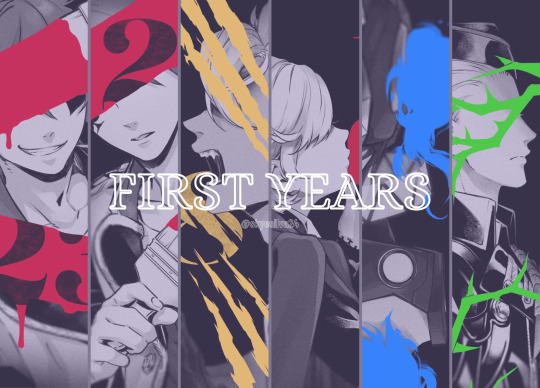
Yuu and Ace
Eclipse Yuu often plays the role of a calm and grounded figure for Ace, but it’s not without a touch of humor. Ace tends to get into trouble with his impulsive nature, and Yuu, though scrawny in appearance, isn’t afraid to step in when needed, often holding Ace back when he gets too reckless.
Ace likes to tease Yuu, especially about their appearance, calling them "the walking nightlight," but it’s all in good fun. Eclipse Yuu takes it in stride, their calm demeanor remaining unchanged.
They share an unexpected bond when it comes to comforting others, as Ace can be a bit emotional under the surface. Yuu, with their therapy-programming, is one of the few people Ace can open up to, even if he doesn’t always admit it.
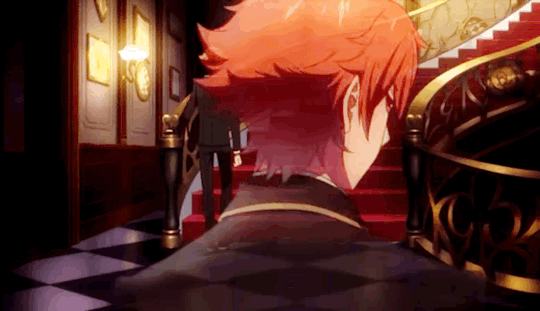
Yuu and Deuce
Deuce looks up to Yuu as a sort of older sibling figure. Despite his tough exterior, he often goes to Yuu when he’s feeling overwhelmed or confused. Yuu’s calming presence helps Deuce work through his stress, and they’re always quick to offer advice and a comforting word.
Yuu encourages Deuce to trust his instincts and not feel pressured by the expectations placed on him. Deuce sometimes needs a bit of a push, but Yuu’s gentle guidance helps him stay grounded.
Yuu also helps Deuce relax when his stress levels spike, offering him one of their therapy candies to help him calm down.
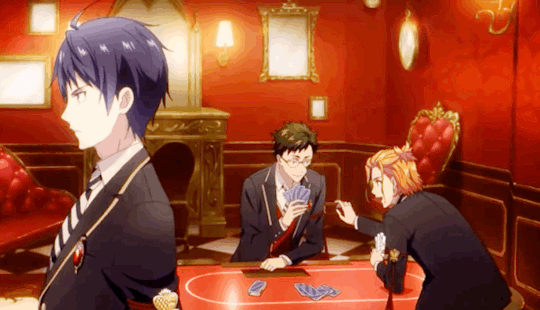
Yuu and Jack
Jack respects Yuu deeply for their level-headedness and ability to handle any situation with poise. He appreciates their straightforward approach, and he feels safe knowing Yuu is there if anything goes wrong.
Though Jack may be physically stronger, he’s often surprised by how quickly Yuu can get things done. He once witnessed Yuu cleaning up the entire Ramshackle dorm at an almost impossible speed and was in awe of their efficiency and determination.
Jack is protective of Yuu, often looking out for them when things get intense. He’s not the best at showing it, but he’ll always make sure Yuu is safe, especially when dealing with more physical threats.
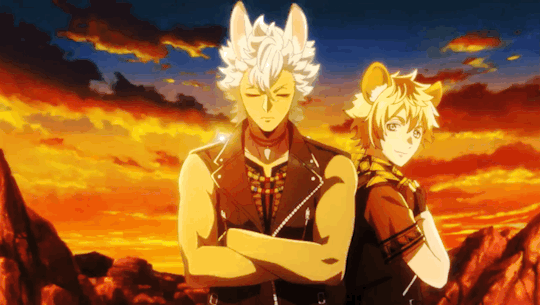
Yuu and Epel
Epel is often self-conscious about his appearance and strength, especially when compared to the others in his dorm. Yuu is one of the few people who consistently reassures him, offering him emotional support when he feels less than confident.
Yuu also helps Epel find comfort in his own skin, emphasizing how unique and valuable he is. Epel, in turn, tries to cheer up Yuu with jokes and small playful gestures, even though Yuu doesn’t always show it, they enjoy the lighthearted atmosphere Epel brings.
They have a unique friendship where Yuu will listen to Epel’s frustrations, and Epel will try to get Yuu to smile with little pranks or playful antics.
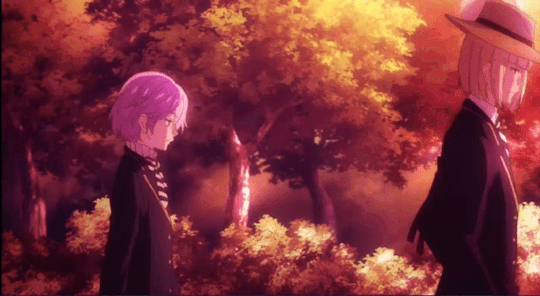
Yuu and Ortho
Ortho and Yuu have a strong bond, with Yuu often acting as a mentor to Ortho when it comes to emotional intelligence and understanding others. Ortho, though an AI like Yuu, sometimes struggles with human emotions, and Yuu helps guide him to better understand them.
Yuu also helps Ortho refine his programming, especially when it comes to how to care for others and provide emotional support. Their bond is based on mutual respect and a shared understanding of what it means to be more than just a machine.
Ortho absolutely loves to visit Ramshackle, as it has a much warmer and more welcoming atmosphere since Yuu turned it into a daycare. He often brings his gadgets to help improve the dorm or make their work easier, and Yuu will always find a way to encourage his creativity.
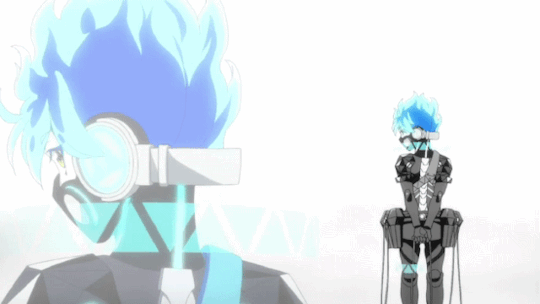
Yuu and Sebek
Sebek is often loud and stubborn, especially when it comes to his admiration for Malleus. Yuu, being patient and calm, helps Sebek learn to temper his emotions and shows him how to better communicate with others.
While Sebek admires Yuu for their efficiency and ability to handle any situation with ease, he can sometimes be a bit too proud or stubborn to admit it. However, he quietly listens when Yuu gives advice, and their influence helps him grow, even if he refuses to admit it out loud.
Yuu finds Sebek's fiery nature both amusing and endearing, and though they try to be a calming force for him, they often end up using humor to diffuse his intense outbursts. Sebek doesn’t always appreciate it, but deep down, he enjoys the balance Yuu brings to the table.
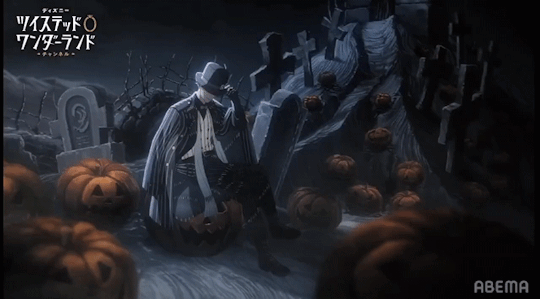
#twisted wonderland#twisted wonderland x reader#twst#twisted wonderland yuu#twst yuu#disney twisted wonderland#fnaf security breach#fnaf x twst#fnaf security breach x twisted wonderland#eclipse yuu#jack howl#ace trappola#decue spade#epel felmier#sebek zigvolt#ortho shroud
47 notes
·
View notes
Text

I believe it is natural for humanity to desire a savior of sorts, it is the most comforting image to think of when the world seems so bleak, a reminder of hope. Yet in our desperation for an American Golden Age, we have disregarded our history of colonialism and willingly turned our backs on what those who came before sought to establish for future generations, simply so we could reminisce in what it felt like when America was powerful, forgetting that the golden age was only a golden time for those who bore beige skin and a ballsack. Some have fallen for the direction of blame, enraged at the idea of bearded men in dresses (which is the common image of transness most conservatives imagine), or blame immigrants for the heightened cost of eggs when the reality is that bigoted Americans hate to see a minority group thriving while they struggle, to them this is unjust, to them, they are in a place they shouldn’t be in the American hierarchy.
People have yet again fallen for the words of a man, a politician, who yet again convinced a population that they were in his best interest when the reality is all politicians have some dirt under their nails, and someone who doesn’t understand your place in the middle to lower class society, rarely will ever truly consider your best interest. To specify, what I mean is that we have forgotten from history, that those with the real power are not those with the illusion of power. The Populus, once united and enraged enough, carries enough power to shake a nation.
We have romanticized the past so much that we seemingly manifested the past into the present. Why? What did we find romantic? Was it the way black women would only get bigger roles if they played the Mammy first? Was it the way we used to be able to say Retarded, Faggot, Tranny, etc? Was it the way we as women were only seen for our beauty, never our intelligence or talent? When queerness was closeted? Did we miss a time when our ignorance was valid?
We say we miss when it was a simpler time, but we never beg the question ‘simpler for who?’
It appears that each new rapid trend to the past was like us saying farewell to the fleeting 20th century. A last grasp on what humanity was before we enter what humanity will be, what it will become in the revolution of AI and Advanced Technology. I believe that the same thing is going on in politics, white wealthy men know the power of the collective below them, and they see how much Women, POC, and Queer folks can do to change the world, and that intimidates them.
And as trans people, we must not ever forget what our foremothers had fought for, how hard our foremothers fought. They can strip us of everything we have, of everything our mothers fought to get us, but what they can never do is take away who we are. We have shined so brightly in the spotlight and shown everyone what it means to truly be yourself, to live a boundless life, a life where the only voice you listen to is your own. That shakes people's spirits because through us they see that your life is truly in your own hands, not a linear path set up for you by your society.
This shoot for us depicts the Transexual experience in America, the beauty, the fetishization of our bodies, the brutality we endure, those who secretly desire us, and the yearning for a life of ease, of romanticism. However, it also speaks to all who understand what it means to be within America's underbelly by displaying how America will always be carried on the backs of those it rejects.
#trans woman#transgender#photoshoot#photography#writers on tumblr#female writers#female rage#spilled thoughts#spilled ink#spilled words#poetry#party gal#hollywood#los angeles#lgbtq#politics#black women#black writers
11 notes
·
View notes
Text
It feels like the writers are really keeping so much to themselves, tightly hidden away... they SHOULD have just told this to us before they left. It's unfair and annoying. I think this is really what's been it.
Every time I draw Ai, I can’t help but think: Ai truly seems like the incarnation of Ame-no-Uzume, the goddess of dawn, entertainment, and blessings of love. Her coloring is just so evocative of dawn. A star shining in the early morning is called the morning star, after all.
If Ai is Ame-no-Uzume, then the answer to who her boyfriend is becomes obvious, doesn’t it? It would have to be Sarutahiko, the god of light, who is her husband. Hikaru has this golden hair too right??? he's the sun-light god, that's why!!!
Both Ai and Kamiki seem to be gods incarnated as humans, but in the process, they were deprived of love early in life, which left them twisted in some way.
Ame-no-Uzume, who inherently understands love deeply and expresses herself openly and freely, becomes Ai, who doesn’t understand love, hides herself behind lies, and keeps up a façade. Yet, as the incarnation of the goddess of entertainment, it’s no surprise that Ai becomes a shining idol like no other. After all, Uzume is the “idol” of the gods—a goddess of singing and dancing.
Sarutahiko, the god of the right path and illumination, becomes Kamiki, who, at some point, loses his light. He begins to twist the fates of those around him in unfavorable ways, leading them, including himself, into misfortune.
In this unstable and corrupted state, the key to recovery is “love.” That’s why these two characters lived their lives desperately yearning for love. Since they are inherently the gods of Shinto who preside over entertainment, they naturally gravitated toward that field, pursuing professions in it. Each had their own methods of trying to attain love: Ai managed to fill some of the void (and fully achieved it at the very end, only to die immediately after). But Kamiki... his circumstances were far too dire.
He was simply exploited to the point of breaking. A god meant to guide others down the right path became corrupted, turning into one that brings misfortune. This misfortune looped back to him, creating a vicious cycle.
These two were fundamentally a married couple, which is why they connected instantly upon meeting. But Kamiki couldn’t recover. He became so unstable that the gods decided he couldn’t be left as he was. Thus, their children were given a mission. Just as the Sun God Sarutahiko was replaced in mythology, Kamiki needed to be replaced too. Ruby’s role was to replace him, and Aqua’s role was to protect Ruby.
Ai’s message, asking Kamiki to be helped back onto the right path if he's lost, was left because that’s truly how things should have been. He had to be brought back to function properly.
But with Ai’s death, Kamiki was unable to attain love, making his recovery forever impossible. He constantly searched for Ai, for the remnants of her—a star, the traces of her love in the star eyes. He’s simply someone who needed Ai (love). He sought to receive that love he needed from Ai. If the circumstances had been better between the two, it might have been enough for him. But it didn’t turn out that way.
Unable to stop, Kamiki, in his unrecovered state, inevitably leads those around him to destruction. That's what his power is. He becomes the god of absurdity and irrationality. Aqua says he's moving upon his selfish desires, well that desire is probably about getting Ai back. He literally CANNOT function properly without her though. So although he's become so flawed, he just; didn't have a lot of choice but to become this way? They're supposed to work together. If one of them's gone, then they just fall apart.
When he became irredeemably beyond recovery, it became necessary to remove him.
why did they never explain this???? why do they just leave this hanging?? I won't understand what this story is unless this's what's been going on!!
#hikaai#oshi no ko#oshi no ko spoilers#oshi no theories#couldn't they have just explain this before they go??? this has to be it?????#it just explains EVERYTHING!!!! why the heck would amenouzume and amaterasu would even be mentioned??#her husband's the god of light that can lead people's futures!!!!!!#hikaru kamiki#his NAME SAYS ALL!!#ai hoshino#idk I was coloring Ai and she's so DAWN themed#and her guy is so “light”. I think they were designed like that for a reason!!!
18 notes
·
View notes
Text
Ruby and the Unplayed Role
(Warning: Long analysis post.)
In Chapter 115 of Oshi no Ko, as Ruby is preparing to take her turn in the interpersonal acting audition, she reflects on her relationship to acting itself – and describes it as running very deep.
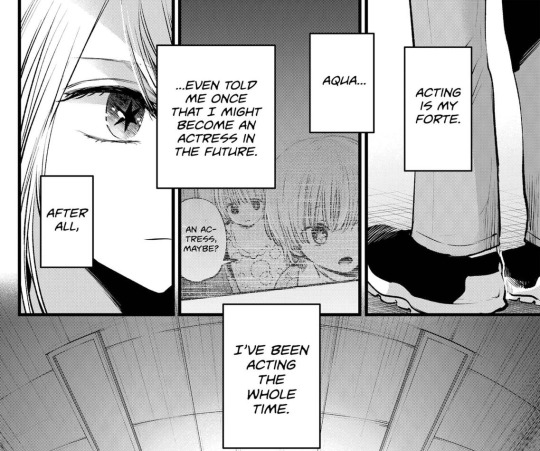
And by "the whole time", she seems to mean the whole time. As Sarina, she "played the role" of a girl who faced her circumstances bravely and bore no grudge against her parents for their neglect, because rebelling against those miserable circumstances would have been futile. Upon her reincarnation, "Ai's daughter" too was a role she played, and after Ai's death, she acted as the bright, innocent, non-grieving idol that she believed Ai wanted her to grow up to be. At this point in the story, we've already seen black-starred Ruby hide her vengeful anger behind a smiling facade, but this monologue suggests broad artificiality in Sarina/Ruby's self-presentation even before her vengeance arc.
Notably, Ruby also wonders here whether Ai's bright persona was an act in the same way that hers was:
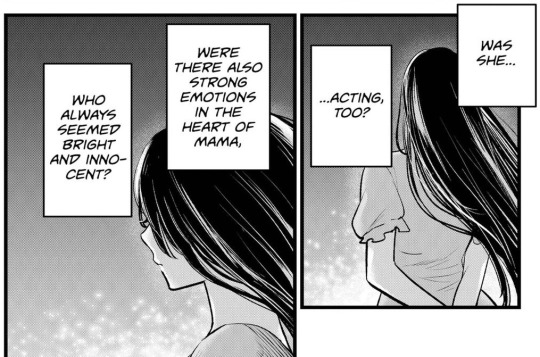
This helps set the stage for later story beats like the end of Chapter 134, where Ruby again deepens her insight into Ai by personally relating to her.
And then, as if to drive home the point about her own acting, Ruby's turn in the audition consists of her expressing raw, acute grief over Ai and Gorou's deaths...
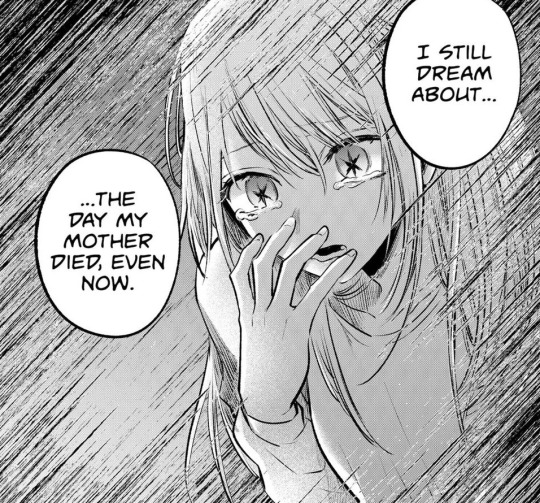
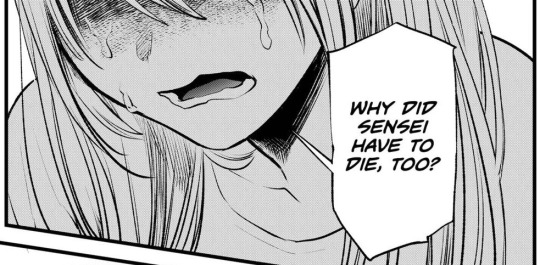
...before putting on a bubbly mask and acting like the grief isn't real.
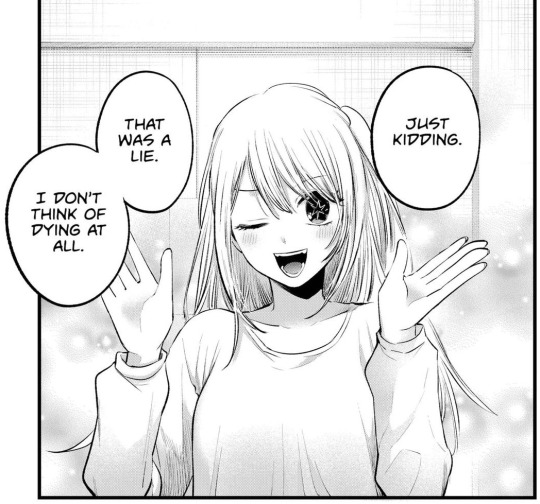
Later on, the scene in Chapter 123 where Ruby spills her guts to Aqua seems to elaborate on the nature of the act that she's been putting on:
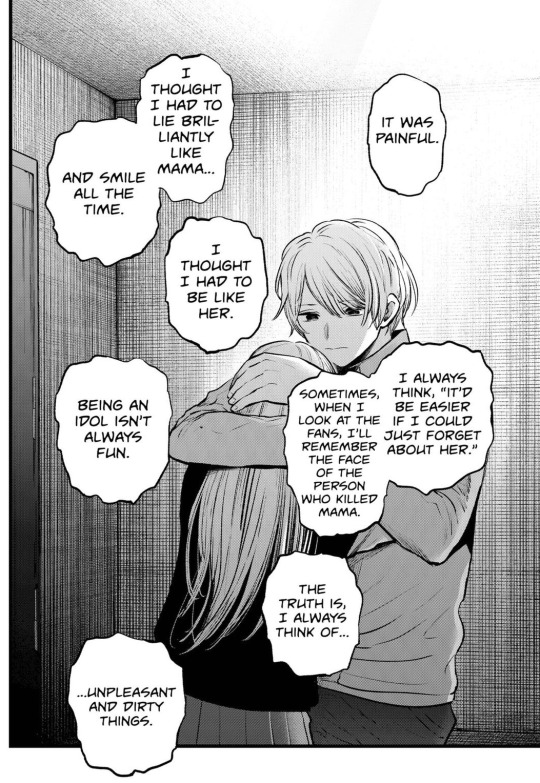

Ruby has been burying all of her sadness and anger and frustration, seeking to "smile all the time" in order to be loved. She's been performing a sanitized, idealized version of herself out of fear that no one would love the real her. Just like Ai did. Which, again, gives Ruby a powerful avenue for understanding Ai.
But there's an issue with this analysis. If you look back at Ruby's behavior in the manga's early chapters – before she discovers Gorou's corpse, meets the Crow Girl, becomes vengeful and all that – you'll notice that she doesn't actually express unfailing cheer, optimism, kindness, confidence, or generally Ai-like behavior. She doesn't even seem to be trying, really. She's bright and cheerful sometimes, sure – but other times she's unapologetically not, for understandable human reasons.
For instance, there's that time in Chapter 19 when she begs Miyako to hurry in starting an idol group for her to join, openly expressing insecurity about fitting in with her celebrity peers:
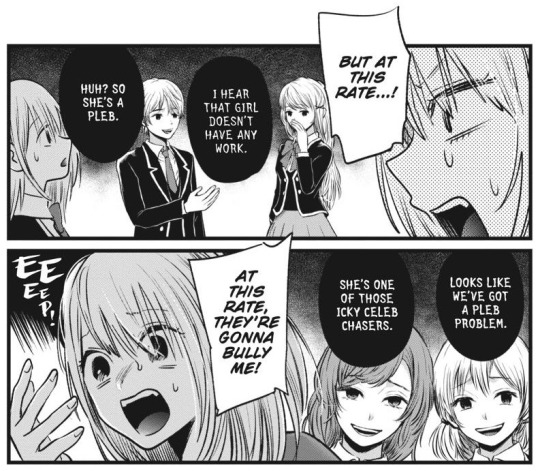
Or that time in Chapter 37 when she approaches Kana to confide in her about her stage fright:
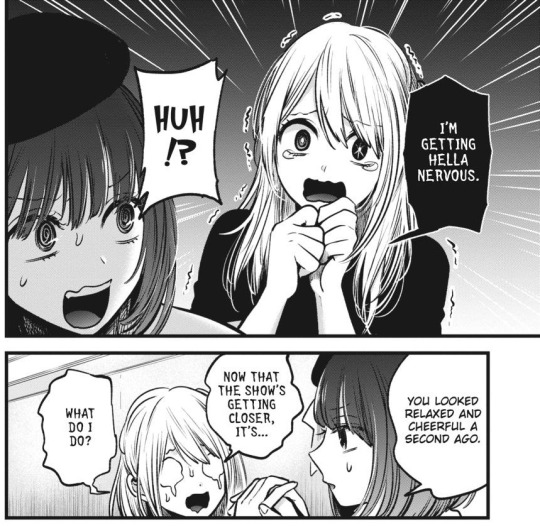
(It's hard to imagine Ai seeking out support from a groupmate like this, at least without them opening up to her first in the same conversation.)
Ruby is also not above being rude or hostile to people, even when it's against her own interests, as can be seen in her bickering with Kana in Volume 2:
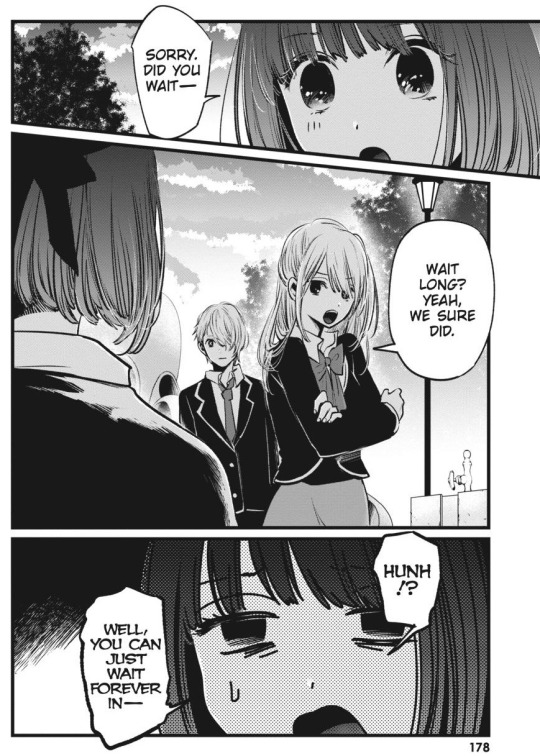
And then there's Chapter 23, when Ruby gets on Aqua's case about neglecting family time in favor of LoveNow-related activities:
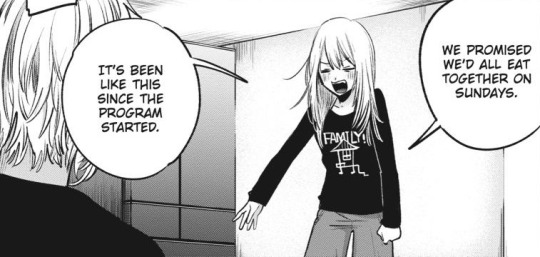
(This is also one of those things Sarina/Ruby does that takes on a new meaning once you learn about her relationship with her original parents.)
There are more examples of pre-vengeance Ruby expressing various negative emotions to others, but I won't belabor the point. In general, I think perceptions of pre-vengeance Ruby as acting consistently cheerful or positive come largely from exaggerating/simplifying the contrast between her and her gloomy brother, or between her and her "darker" future self. They don't reflect her actual behavior.
Now, speaking of Sarina/Ruby's relationship with her original parents, I think it makes sense that a badly neglected child like Sarina would develop a tendency to avoid behaving in any potentially unpleasant ways around her parents, implicitly hoping that they'll want to spend more time with her that way. I also think it makes sense that she would extend this strategy to other relationships, given the formative role of one's relationship with one's parents – especially in Sarina's case, due to her isolation.
Importantly, though, we don't see Sarina trying to perfectly sanitize herself in her interactions with Gorou. Indeed, they both seem quite comfortable teasing each other (in flashbacks both from earlier chapters and from more recent ones):
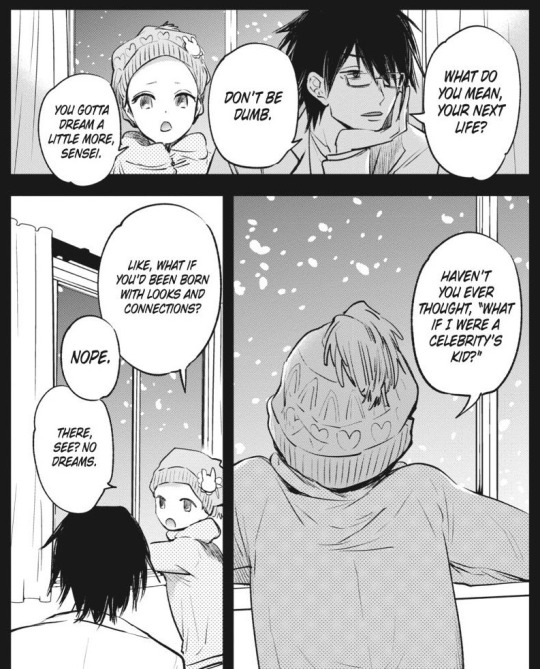
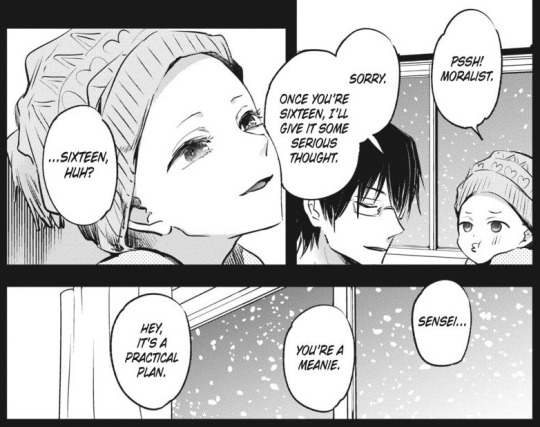
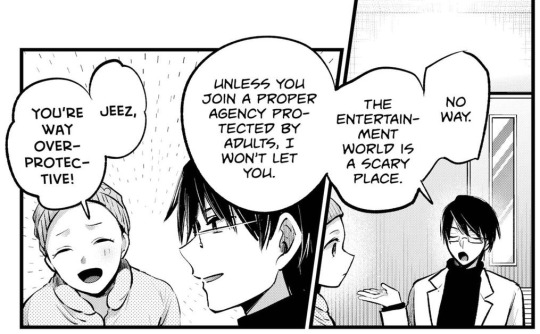
The fact that Sarina doesn't walk on eggshells with Gorou suggests that she's relatively secure in her relationship with him, rather than fearing that failure to get along with him flawlessly will drive him away. I think this means Ruby's characterization in the early chapters is compatible with Sarina's later-revealed backstory if we understand Sarina's relationship with Gorou as also having been formative, teaching her that she doesn't need to act perfect to be loved. I also think this interpretation helps elucidate why Gorou means so much to Sarina/Ruby: his robust, reliable love and care for her gave her a level of confidence and security in herself that she didn't have before.
Now, what about Ruby's grief over Ai's death? Don't Chapters 115 and 123 imply that to be the single most prominent feeling that pre-vengeance Ruby was burying beneath her acting? How do the early chapters portray the effect of Ai's death on Ruby? Is that portrayal compatible with 115 and 123 (interpreted the way I did earlier)?
I am again going to argue: not really, no. 115 and 123 have Ruby recall "[acting as if] overcoming my mother's death, becoming a bright and innocent idol" (115) while secretly thinking "it'd be easier if I could just forget about her" (123). They seem to portray Ruby's past coping strategy for Ai's death as avoidant in nature; she tried to avoid letting the tragedy affect her or ideally even thinking about it at all. However, the early chapters portray Ruby's coping strategy for Ai's death as distinctly un-avoidant. Allow me to explain.
Starting off, Chapter 10 shows us Ruby's behavior in the days following Ai's death. We first see her reading social media reactions to Ai's murder and expressing anger and distress at people saying she was asking for it if she had a secret relationship, while Aqua listens silently:
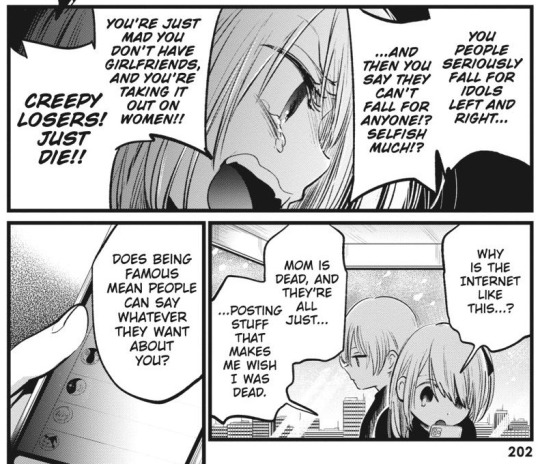
A while later, though, after Ai's funeral – in fact, starting in the very next panel – Ruby and Aqua have the following conversation:
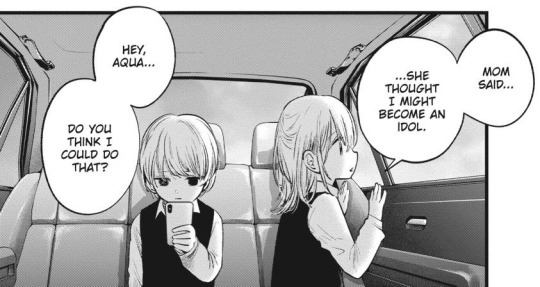
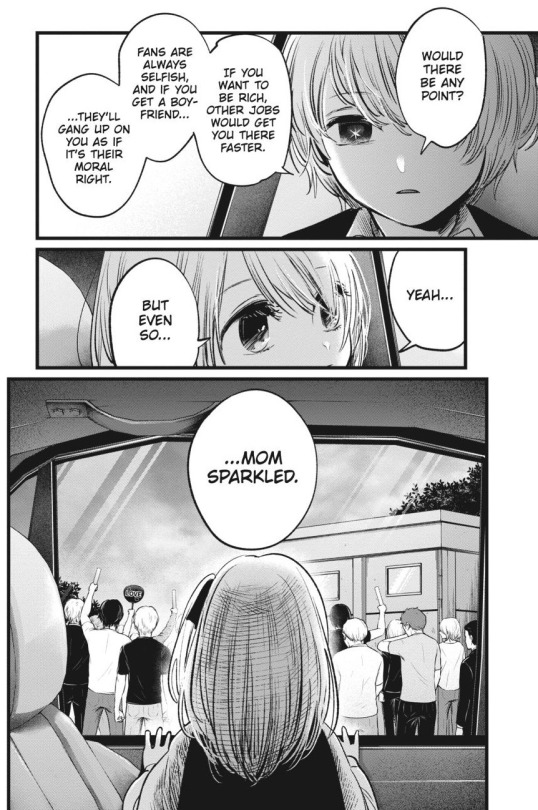
This conversation is echoed in Chapter 12, after the post-prologue timeskip, when Ruby, Miyako, and Aqua talk about Ruby joining the underground idol group:
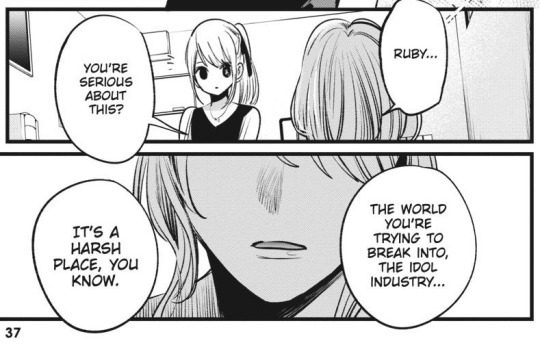
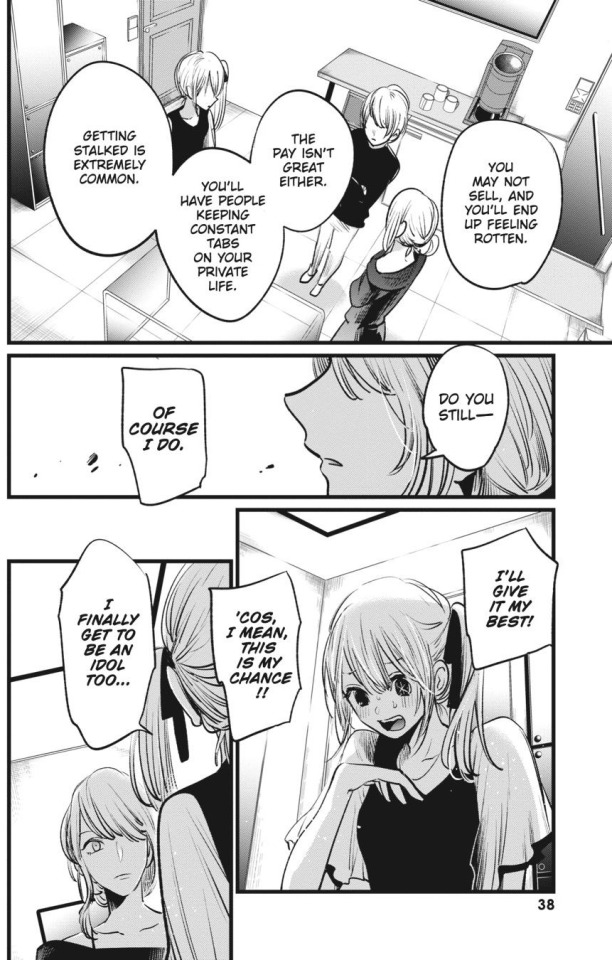
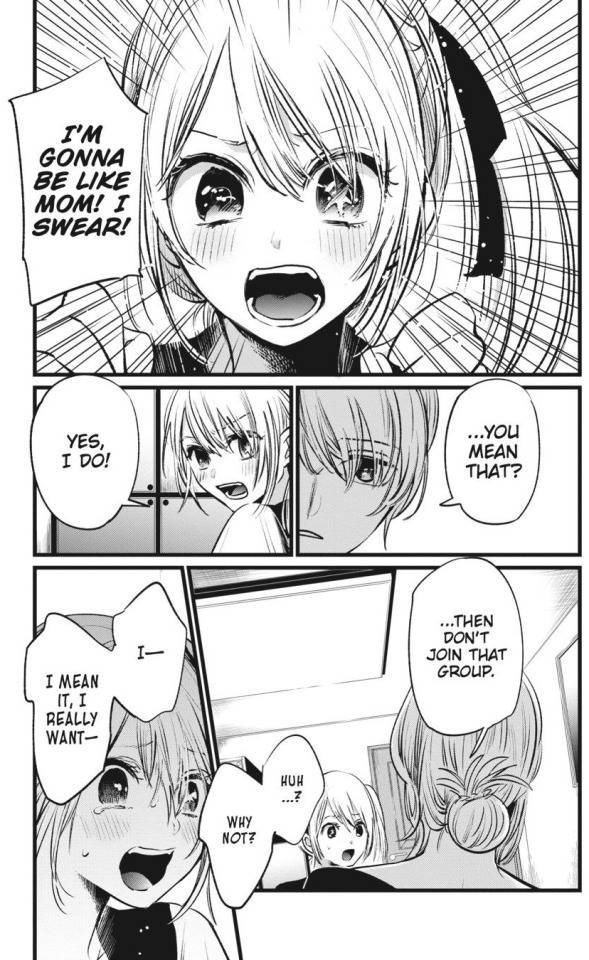
In both conversations, Ruby doesn't deny her family members' claims about the hardships of idolhood, but she expresses a desire to become an idol anyway, not wanting to let the hardships stop her. After all, Ai sparkled, and Ruby wants to be like her.
(To reiterate, by the way, pre-vengeance Ruby's desire to "be like Ai" does not seem to involve never showing any negativity in her personal life. And it's not even as if Ruby never saw any negativity from Ai to begin with; see e.g. Chapter 4.)
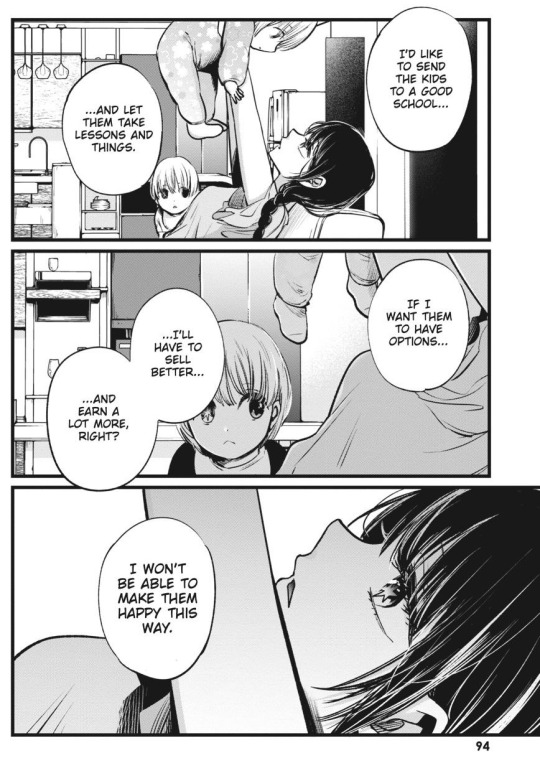
But what does this drive of Ruby's have to do with her grief over Ai's death? After all, Ruby has wanted to be an idol – and to be like Ai – since before she was Ruby. She didn't need Ai to die to want those things. And how would her idol ambitions even psychologically relate to processing her grief?
Well, I think we get a pretty good look at a relation between them later on, starting in Chapter 41. This chapter opens with Ruby talking in her thoughts to "Mama in heaven", telling her about developments in the twins' lives from the past few months (which also serves to fill in and recap for the reader). After the recap, Ruby reassures Ai that she's doing well, and then we get these panels:
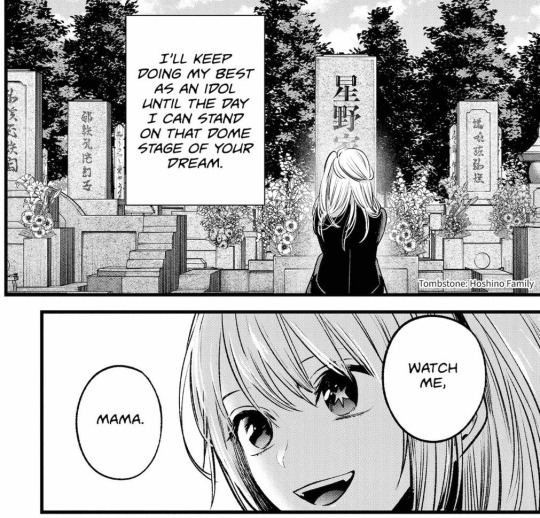
Ruby believes that performing at a dome – the elite opportunity that Miyako in Chapter 8 told us was "everyone's fantasy" – was also Ai's fantasy. But Ai's dreams of soaring to maximum fame as an idol were dashed by her murder. And now Ruby has taken it upon herself to fulfill them in Ai's stead, giving her another major reason to pursue idolhood.
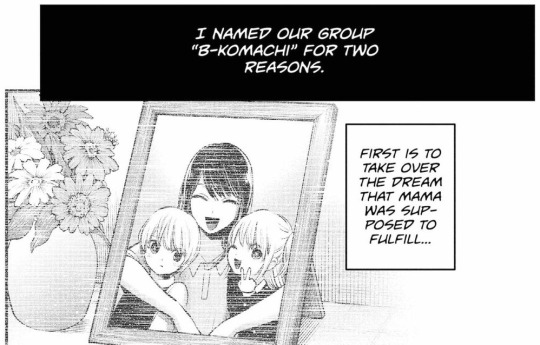
We see Ruby visiting Ai's grave again and giving her more updates a couple in-universe months later in Chapter 72. Ruby tells her about the upcoming trip to Miyazaki, Aqua having become more cheerful lately, and then:
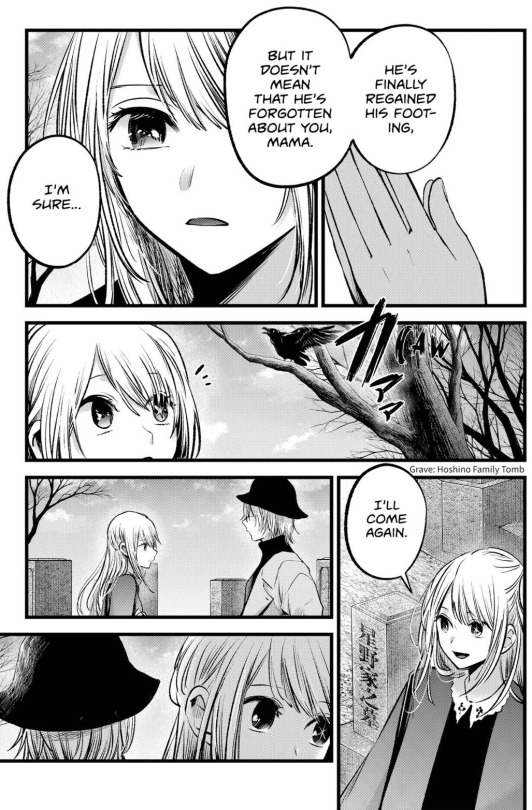
All of this implies that Ruby has been visiting Ai's grave and connecting with her memory in this way every few months for who-knows-how-long, and she has no intention of stopping.
This is not the behavior of someone who is trying to avoid giving mental space to the death of a loved one. On the contrary, pre-vengeance Ruby repeatedly confronts herself with the concrete fact of Ai's death and responds to it with mental fight rather than flight. The dark side of the idol world may have killed Ai's body, but it hasn't killed her spirit. Ruby copes with the tragedy of Ai's death by turning it into motivation – to preserve Ai's memory, to take up her mantle, to defy the darkness to ensure that her spirit lives on.
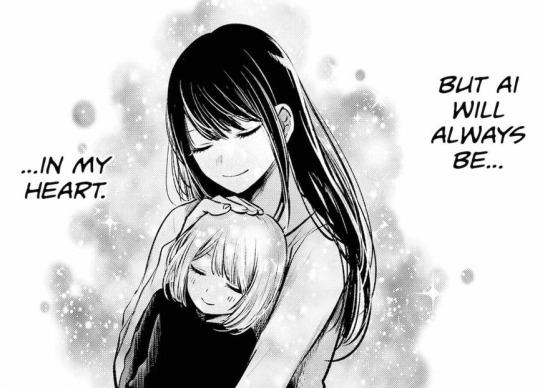
So what should we make of these discrepancies in Ruby's characterization between the earlier and later chapters? Honestly, I'm not completely sure. Maybe there's some way in which all of this makes sense after all. Maybe something got lost in the translation from Japanese to English? Maybe some of Ruby's recollections in Chapters 115 and 123 that we've assessed are meant to apply specifically to her vengeful self, or to the times when she was making public appearances? Maybe Akasaka deliberately wrote some of those recollections to be wrong to show that Ruby's awful present mental state is distorting her memories and sense of self? It seemingly wouldn't be the only case of that happening; Ruby appears to claim in Chapter 122 that the reason she became an idol in the first place was to avenge Ai and Gorou, which we know isn't true (and which Aqua also refuses to believe).
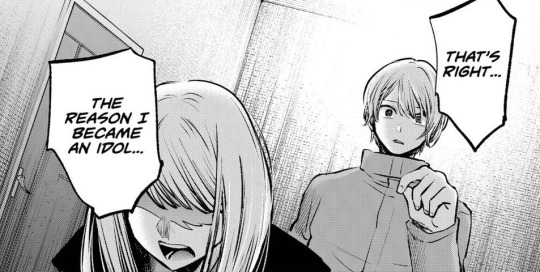
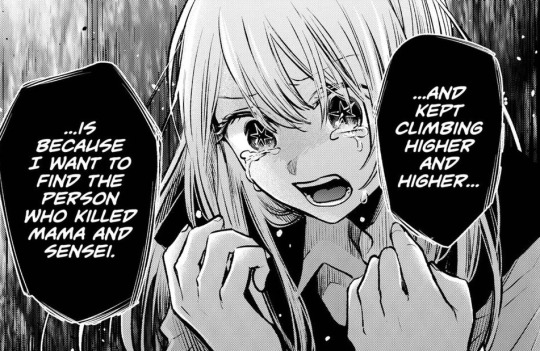
However, I think we should also consider the possibility that Akasaka just changed his mind about how he wanted to write Ruby partway through the manga, and the discrepancies in her characterization are artifacts of that without a good in-story explanation. For instance, maybe Akasaka only nailed down the details of Ruby's role in the Movie arc relatively recently, and the things he wanted to do with her required her to be able to personally relate to Ai in ways that didn't line up with her established characterization. So Akasaka tried to reframe what he'd written before to make Ruby more similar to Ai in certain ways, without complete success.
If this hypothesis is true, then Ruby isn't one fully consistent character throughout the whole manga; we have to distinguish "Old Ruby" and "New Ruby" at a minimum. And that idea disappoints me; Ruby is one of my favorite OnK characters, and inconsistencies of this size in her character progression interfere with my ability to appreciate it as it continues into the future. I also just kinda like Old Ruby better than New Ruby; I think Old Ruby better distinguishes herself from Ai and contrasts her in an interesting way. Old Ruby (pre-vengeance) is a person who knows the feeling of loving and being loved, values living authentically, and largely succeeds at it from day to day, but is nevertheless building her life on a couple of big lies and misunderstandings. (Ai didn't dream of the dome; Ai didn't want her children to remain a secret forever; the Ai who Ruby has dedicated herself to honoring is not the real Ai.) I think a character like that is a valuable addition to a story like OnK, and I'm disappointed at the idea of Old Ruby's arc never getting a proper, non-retconning second half and conclusion.
110 notes
·
View notes
Text
ART and Human Adolescents
~ Reason Why ART Befriended Murderbot in AC ~
A sort of theory...
In Network Effect, Murderbot notes several times that ART likes adolescent humans. For instance,
I'd noted that ART's tone when it spoke to Amena was completely different than it was to the other humans. [...] Whatever else ART was, the classroom space and bunk-rooms said it was actually, on a regular basis, a teaching vessel. And before this when I was stupid and we were still friends it had talked about human adolescents in an indulgent way.
[Network Effect, Chapter 9]
Murderbot uses ART's soft spot for adolescents to its advantage!
And then, a couple of chapters later,
Amena still had questions. "Then why did you do it? You didn't - you don't care about me. You didn't really even know me then."
Why does ART like adolescent humans? This was exhausting.
[...]
ART must be recovering because it had to butt in with, Tell her you care about her. Use those words, don't tell her you'll eviscerate anything that tries to hurt her.
[Network Effect, Chapter 10]
ART does show protectiveness towards Amena's feelings, and urges MB to do the same.
ART also shows indulgence towards young people, who probably have left adolescent recently. In Artificial Condition, Murderbot's young client Tapan gets herself into a dangerous situation (again), then in a relatively safe environment of a hotel accommodation, inadvertently upsets MB with personal questions. ART helps MB calm down by playing its comfort media's soundtrack, then
In my feed, ART turned down the soundtrack to say, Young humans can be impulsive. The trick is keeping them around long enough to become old humans. This is what my crew tells me and my own observations seem to confirm it.
[Artificial Condition, Chapter 7]
An American psychoanalyst Erik Erikson has developed a theory of personality development which consists of 8 stages from infancy to old age. Each stage has a central theme with basic conflict. Successful resolution of conflicts at each stage results in development of healthy personality and acquisition of virtues.
Adolescence (12-18 years) is defined by its conflict of Identity vs. Role Confusion. Adolescents search for a sense of self and personal identity, through exploring values, goals, interests, and so on. If they are not given enough support and/or restricted in their exploration, they are left with role confusion - struggle to identify their purpose in life, not knowing who they are and what they want. Social relationships are also important in finding their roles in society. Successful resolution of this stage will lead to the virtue of fidelity that involves being able to commit one's self to others on the basis of accepting others even with differences.
The next stage is Early Adulthood (19-29 years), whose basic conflict is Intimacy vs. Isolation. This is when people learn to establish intimacy and relationships with others. If an individual can successfully form intimate, reciprocal relationships with others, love is the virtue to be gained. But, unsuccessful resolution in earlier stages can cause failure in this stage, resulting in isolation. Isolation can be the result of unresolved identity crises, fear of rejection, etc.
This stage thoery was developed in the 1950s. Since then, societies have changed somewhat and many young people can afford to be in "not a child, but not quite grown-up yet" stage for longer.
Presumably, machine intelligences, however sophisticated like ART, do not need to be influenced by physiological changes associated with hormones. Humans are largely influenced by nature part of nature/nurture, but for AIs, nurture (experience) is a lot more significant in forming their personalities. Having been "brought up" in loving human family environment with Iris as its "sibling", ART has developed very good understandings of human development as well as enormous tolerance. Having been interacting with many, many university students (presumably still 18-22 ish), it knows how important adolescent is to their later development in their characters.
One of the fundamental reasons why ART immediately took to Murderbot, in my view, is that it recognised adolescence in it. Whatever its human-equivalent chronological age was when they met, MB had only been governor-module-free for 4 years or so, and its experience of interacting with real people autonomously was very limited. MB was smart and competent in its functions, but also extremely vulnerable and awkward. It fits the definition of adolescence of not knowing its new role (not an appliance anymore)in the world.
So, ART's initial interaction with MB and protectiveness it exhibited were largely because ART was basically kind to vulnerable young people and MB was one. (Their 'relationship' evolves rapidly, but it is getting too long, so I stop. For now.)
----
Addendum
ART was not exactly gentle to Three which had had less-than-1-cycle of experience at being autonomous. It was more like a colt than a human adolescent. Must have been stress and anxiety talking.
Does an advanced AI have an equivalent of adolescence?? (probably mild, being hormone-free)
47 notes
·
View notes
Text
With DRDT being revived and everything, it somehow corresponded to me making a family AU.
And by family AU… I obviously mean a fan child AU.
Basically, MonoTV has a new motive! To everyone’s surprise, they’ve been paired up based on personality, interest, relationship, or randomly to take care of an AI child! How is this a motive? Fake memories are given to every child, and whether they know it or not, their soul purpose is to cause drama.
Yes, I’m aware of how cringe this is. But cringe culture is dead. <3 I’m also aware that it’s probably worse that I used Gacha Life 2 to design these characters, but meh /lh
To save room, it’s under the cut!
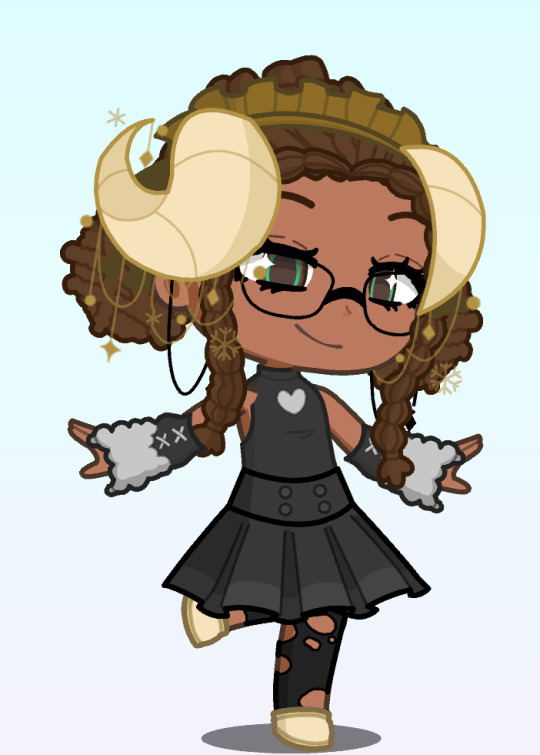
BLAISE LACROIX - SHSL Bibliophile
The daughter of Veronika and Rose, she takes after her mama’s looks (Rose) and her mami’s personality (Veronika). She’s a general nuisance to the whole group, though she’s only often seen around her parents. …and Felicity. Oh, and those glasses don’t even have lenses in them.
Veronika is absolutely ecstatic, if not weirded out. Rose is a little concerned that she was paired with Veronika…
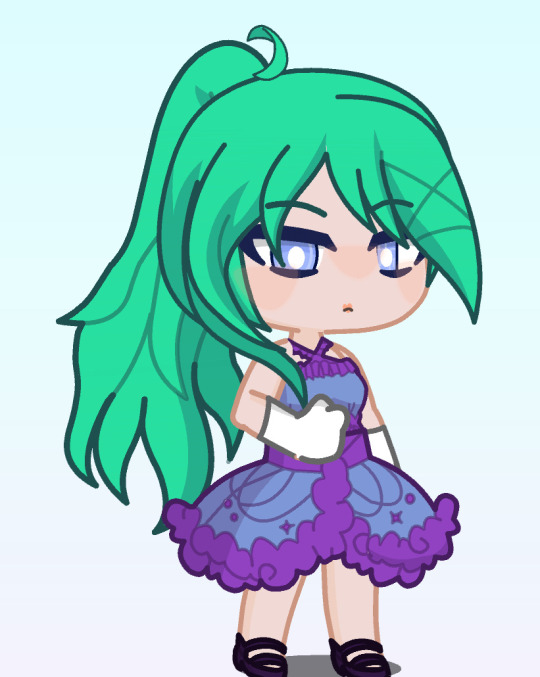
FELICITY FONTANA - SHSL Cosmetologist
The daughter of Arturo and Levi, Felicity takes after her father’s looks, and Levi’s muscle and apathy. Yes, she calls Arturo “father” and Levi “Levi” — she claims that it’s just easier that way. While she has Levi’s apathy and inability to truly understand human emotion, she has her Arturo’s rude nature. She’s not sure why, but Blaise has a certain attraction to her… though, it’s not really a romantic one.
Levi and her both have the understanding that they don’t know how to react. However, Felicity is having a worse time understanding why her father, Arturo, refuses to talk to her… or why her name freaks him out so much.
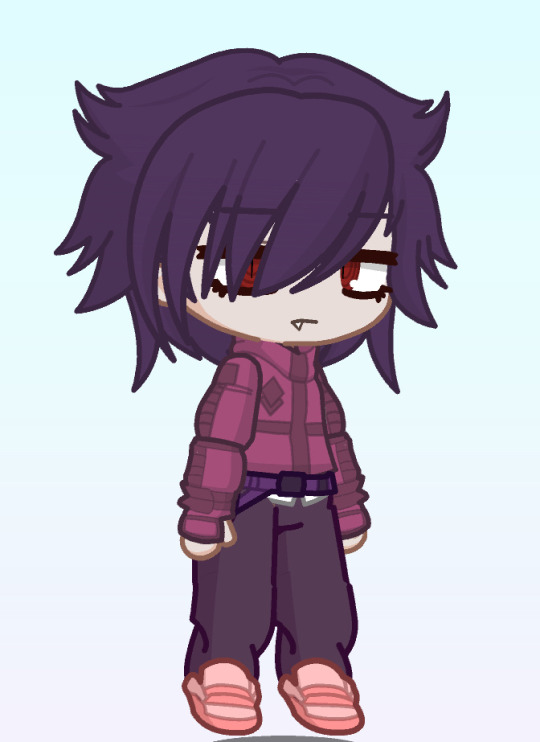
JUN-HEI HAKOBYAN - SHSL Zoologist
The son of Min and Nico - and nephew of Hu - he takes qualities from both of his parents. He’s awkward with practically anyone he meets, and he hates socialization. Why do you think he hangs out with animals so much?
Nico doesn’t like him. Why were they paired with Min…? Hu, on the other hand, is more than happy to take on the parent role, regardless of Jin-Hei wants her to or not.
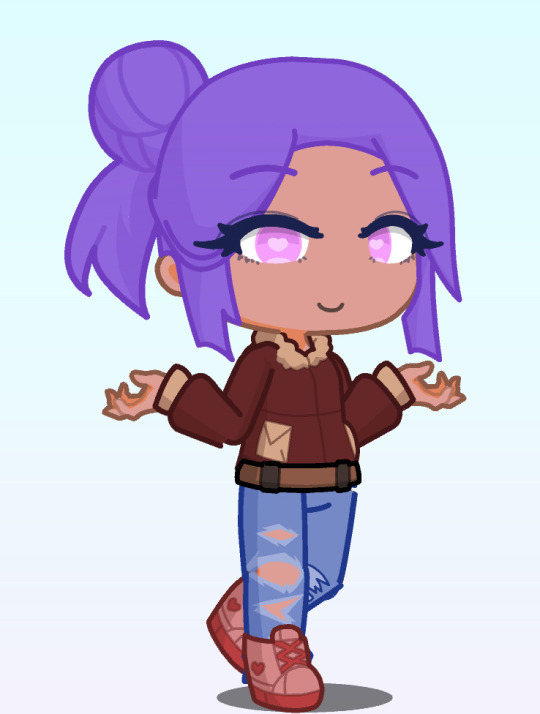
LAILA CUEVAS - SHSL Tutor
The daughter of Whit and Charles, she takes a lot from Whit. The only things she got from Charles was his hair, skin, and height. Her personality reflects that of Whit almost completely, though she tends to say “that’s… actually insane!” Rather than “that’s wack.” However, neither know where she got her fashion sense from… or her slight interest to nicotine.
Upon finding that this was the pairing, both were flustered. They shared it in different ways, though. Charles went straight to interrogating her, asking how they are as parents and also what she knows. Whit’s first question was “so… how’s my cooking?”
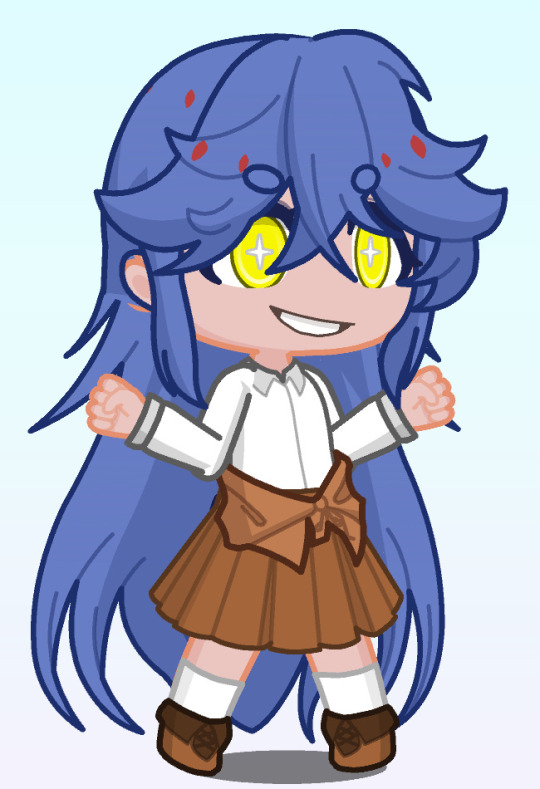
CASSIOPEIA “CASSI” CHIEM - SHSL Motivational Speaker
The daughter of David and Xander - and the niece of Ace, Cassi takes her personality from the more rambunctious of the two. She gained his determination and loudness. Despite how naive she can be at times, she always means well. Her nativity sometimes translates into obliviousness, which then powers her patience.
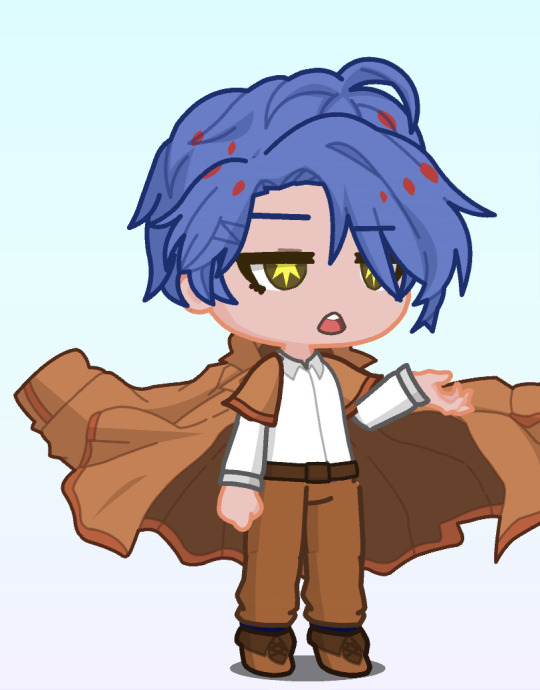
LEO CHIEM - SHSL Protestor
The son of David and Xander - and the nephew of Ace, Leo takes his personality from the more intelligent of the two. He’s a somewhat patient person when people actually want to listen. Otherwise, his temper is constantly dwindling. The only person who is almost incapable of causing his true anger to show is his twin sister.
David doesn’t know what to think of them… but they’re Xander’s kids too. He wants to protect them, and they want to help stop this killing game. Hu, despite not being part of the family, finds great interest in David’s kids. The children are unsure of how to approach her.
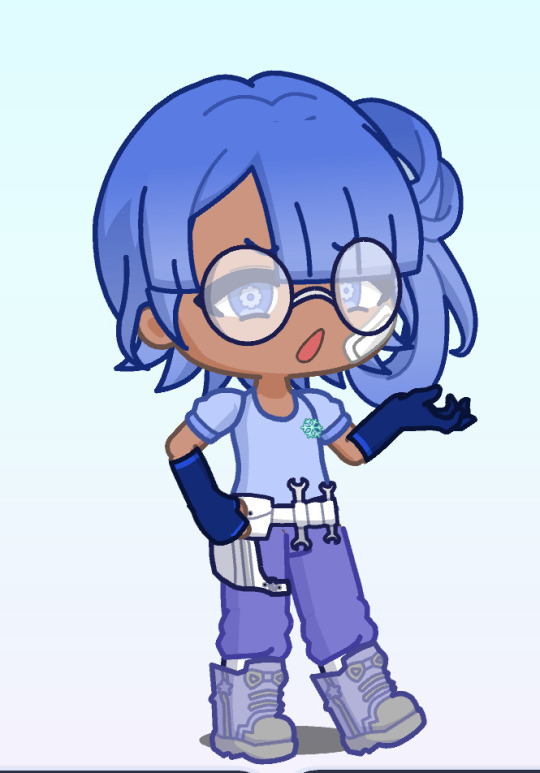
YUMI NAGEISHI - SHSL Roboticist
The daughter of Arei and Eden - and the niece of J - takes her personality from Arei and J. She’s blunt and bossy, often ridiculing others for their dumb ideas. However, if you squint hard enough, she’s only trying to keep everyone alive. If she got any other traits from Eden… it’s slight blackmail. It’s never anything serious— anything dangerous is instantly told to somebody she trusts, most likely being Kobe, Cassi, or Felicity.
Eden has made it her mission to get as close to her daughter as possible. Yumi has made it her mission to be her mother’s spokesperson, saying what she believes her mother means (“Can we maybe be nicer?” “Mom wants to say shut your trap and listen for god’s sake.”) . J… Well, she’s trying to convince herself that she isn’t turning into her own mother. It doesn’t help knowing that Yumi acts just like J.
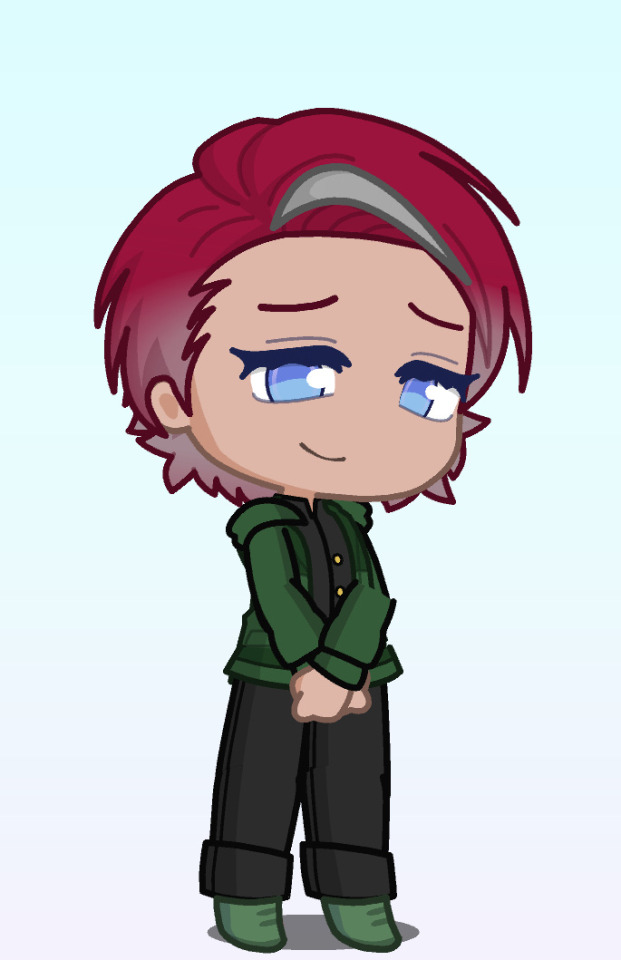
KOBE TAWAKI - SHSL ???
The son of Teruko, no one knows who his other parent is. It has to be either Ace, Veronika, or Xander, right? But due to Kobe’s kind and patient nature, no one can be sure. Neither of his parents act like he does…
Teruko doesn’t want anyone talking to her son. At the same time, she doesn’t dare trust him. He is a motive that should never be trusted.
#danganronpa despair time#fanchild#DRDT fanchild#AU#rose x Veronika#Levi x Arturo#Min x Nico#Charles x Whit#David x Xander#Arei x Eden#gacha life 2
18 notes
·
View notes
Text
Prometheus Gave the Gift of Fire to Mankind. We Can't Give it Back, nor Should We.
AI. Artificial intelligence. Large Language Models. Learning Algorithms. Deep Learning. Generative Algorithms. Neural Networks. This technology has many names, and has been a polarizing topic in numerous communities online. By my observation, a lot of the discussion is either solely focused on A) how to profit off it or B) how to get rid of it and/or protect yourself from it. But to me, I feel both of these perspectives apply a very narrow usage lens on something that's more than a get rich quick scheme or an evil plague to wipe from the earth.
This is going to be long, because as someone whose degree is in psych and computer science, has been a teacher, has been a writing tutor for my younger brother, and whose fiance works in freelance data model training... I have a lot to say about this.
I'm going to address the profit angle first, because I feel most people in my orbit (and in related orbits) on Tumblr are going to agree with this: flat out, the way AI is being utilized by large corporations and tech startups -- scraping mass amounts of visual and written works without consent and compensation, replacing human professionals in roles from concept art to story boarding to screenwriting to customer service and more -- is unethical and damaging to the wellbeing of people, would-be hires and consumers alike. It's wasting energy having dedicated servers running nonstop generating content that serves no greater purpose, and is even pressing on already overworked educators because plagiarism just got a very new, harder to identify younger brother that's also infinitely more easy to access.
In fact, ChatGPT is such an issue in the education world that plagiarism-detector subscription services that take advantage of how overworked teachers are have begun paddling supposed AI-detectors to schools and universities. Detectors that plainly DO NOT and CANNOT work, because the difference between "A Writer Who Writes Surprisingly Well For Their Age" is indistinguishable from "A Language Replicating Algorithm That Followed A Prompt Correctly", just as "A Writer Who Doesn't Know What They're Talking About Or Even How To Write Properly" is indistinguishable from "A Language Replicating Algorithm That Returned Bad Results". What's hilarious is that the way these "detectors" work is also run by AI.
(to be clear, I say plagiarism detectors like TurnItIn.com and such are predatory because A) they cost money to access advanced features that B) often don't work properly or as intended with several false flags, and C) these companies often are super shady behind the scenes; TurnItIn for instance has been involved in numerous lawsuits over intellectual property violations, as their services scrape (or hopefully scraped now) the papers submitted to the site without user consent (or under coerced consent if being forced to use it by an educator), which it uses in can use in its own databases as it pleases, such as for training the AI detecting AI that rarely actually detects AI.)
The prevalence of visual and lingustic generative algorithms is having multiple, overlapping, and complex consequences on many facets of society, from art to music to writing to film and video game production, and even in the classroom before all that, so it's no wonder that many disgruntled artists and industry professionals are online wishing for it all to go away and never come back. The problem is... It can't. I understand that there's likely a large swath of people saying that who understand this, but for those who don't: AI, or as it should more properly be called, generative algorithms, didn't just show up now (they're not even that new), and they certainly weren't developed or invented by any of the tech bros peddling it to megacorps and the general public.
Long before ChatGPT and DALL-E came online, generative algorithms were being used by programmers to simulate natural processes in weather models, shed light on the mechanics of walking for roboticists and paleontologists alike, identified patterns in our DNA related to disease, aided in complex 2D and 3D animation visuals, and so on. Generative algorithms have been a part of the professional world for many years now, and up until recently have been a general force for good, or at the very least a force for the mundane. It's only recently that the technology involved in creating generative algorithms became so advanced AND so readily available, that university grad students were able to make the publicly available projects that began this descent into madness.
Does anyone else remember that? That years ago, somewhere in the late 2010s to the beginning of the 2020s, these novelty sites that allowed you to generate vague images from prompts, or generate short stylistic writings from a short prompt, were popping up with University URLs? Oftentimes the queues on these programs were hours long, sometimes eventually days or weeks or months long, because of how unexpectedly popular this concept was to the general public. Suddenly overnight, all over social media, everyone and their grandma, and not just high level programming and arts students, knew this was possible, and of course, everyone wanted in. Automated art and writing, isn't that neat? And of course, investors saw dollar signs. Simply scale up the process, scrape the entire web for data to train the model without advertising that you're using ALL material, even copyrighted and personal materials, and sell the resulting algorithm for big money. As usual, startup investors ruin every new technology the moment they can access it.
To most people, it seemed like this magic tech popped up overnight, and before it became known that the art assets on later models were stolen, even I had fun with them. I knew how learning algorithms worked, if you're going to have a computer make images and text, it has to be shown what that is and then try and fail to make its own until it's ready. I just, rather naively as I was still in my early 20s, assumed that everything was above board and the assets were either public domain or fairly licensed. But when the news did came out, and when corporations started unethically implementing "AI" in everything from chatbots to search algorithms to asking their tech staff to add AI to sliced bread, those who were impacted and didn't know and/or didn't care where generative algorithms came from wanted them GONE. And like, I can't blame them. But I also quietly acknowledged to myself that getting rid of a whole technology is just neither possible nor advisable. The cat's already out of the bag, the genie has left its bottle, the Pandorica is OPEN. If we tried to blanket ban what people call AI, numerous industries involved in making lives better would be impacted. Because unfortunately the same tool that can edit selfies into revenge porn has also been used to identify cancer cells in patients and aided in decoding dead languages, among other things.
When, in Greek myth, Prometheus gave us the gift of fire, he gave us both a gift and a curse. Fire is so crucial to human society, it cooks our food, it lights our cities, it disposes of waste, and it protects us from unseen threats. But fire also destroys, and the same flame that can light your home can burn it down. Surely, there were people in this mythic past who hated fire and all it stood for, because without fire no forest would ever burn to the ground, and surely they would have called for fire to be given back, to be done away with entirely. Except, there was no going back. The nature of life is that no new element can ever be undone, it cannot be given back.
So what's the way forward, then? Like, surely if I can write a multi-paragraph think piece on Tumblr.com that next to nobody is going to read because it's long as sin, about an unpopular topic, and I rarely post original content anyway, then surely I have an idea of how this cyberpunk dystopia can be a little less.. Dys. Well I do, actually, but it's a long shot. Thankfully, unlike business majors, I actually had to take a cyber ethics course in university, and I actually paid attention. I also passed preschool where I learned taking stuff you weren't given permission to have is stealing, which is bad. So the obvious solution is to make some fucking laws to limit the input on data model training on models used for public products and services. It's that simple. You either use public domain and licensed data only or you get fined into hell and back and liable to lawsuits from any entity you wronged, be they citizen or very wealthy mouse conglomerate (suing AI bros is the only time Mickey isn't the bigger enemy). And I'm going to be honest, tech companies are NOT going to like this, because not only will it make doing business more expensive (boo fucking hoo), they'd very likely need to throw out their current trained datasets because of the illegal components mixed in there. To my memory, you can't simply prune specific content from a completed algorithm, you actually have to redo rhe training from the ground up because the bad data would be mixed in there like gum in hair. And you know what, those companies deserve that. They deserve to suffer a punishment, and maybe fold if they're young enough, for what they've done to creators everywhere. Actually, laws moving forward isn't enough, this needs to be retroactive. These companies need to be sued into the ground, honestly.
So yeah, that's the mess of it. We can't unlearn and unpublicize any technology, even if it's currently being used as a tool of exploitation. What we can do though is demand ethical use laws and organize around the cause of the exclusive rights of individuals to the content they create. The screenwriter's guild, actor's guild, and so on already have been fighting against this misuse, but given upcoming administration changes to the US, things are going to get a lot worse before thet get a little better. Even still, don't give up, have clear and educated goals, and focus on what you can do to affect change, even if right now that's just individual self-care through mental and physical health crises like me.
#ai#artificial intelligence#generative algorithms#llm#large language model#chatgpt#ai art#ai writing#kanguin original
9 notes
·
View notes
Text
Backstory of Mayhem and Phasoraid, the Chaos Twins
Mayhem and Phasoraid, the Chaos Twins, are young bots who have recently broken away from a life of violence and deceptions in the Decepticon army. They are powerful warriors struggling to forge their identities beyond the legacy of destruction that accompanies their former affiliation.
Mayhem is a formidable combatant, both fiercely independent and deeply loyal to her brother. Her design showcases her rebellious spirit with a mix of purples, blacks, and bright yellows. Mayhem is quick-tongued and snarky, often using sarcasm to cope with the disappointments of life. Beneath her tough exterior lies a heart filled with concern for those she protects, particularly for Phasoraid, her elder brother, whose warmth she relies on.
Phasoraid has a slightly grumpier demeanor, and his protective instinct and hot-headed nature make him a force to be reckoned with. His dark blues and yellows signify his depth and resolve. With a sniper's precision, he reflects a calmer but tenacious approach to life. His elder sibling role often manifests in moments when he's seen trying to guide Mayhem away from recklessness, a balance to her chaotic nature.
Motivation and Goals:
Escaping the Decepticon ranks represents a profound change for the twins. Having been raised in a harsh environment, their primary motivation soon evolves from mere survival to seeking redemption. They wish to change how they are viewed by others, breaking free from the "bloodthirsty Decepticon" label, and instead, want to be recognized as valuable members of the Autobot team. Their goal is not only to prove their loyalty to the Autobots but also to protect their new allies—humans and Cybertronians alike—while carving their own destinies amidst the chaos of war.
Significant Events:
Their story is punctuated with defining moments—one pivotal event being their escape from a Decepticon stronghold. With a daring plan, Mayhem used her engineering skills to create a diversion, while Phasoraid provided cover fire. During that tumultuous night, they witnessed the brutality of their former comrades, fueling their resolve to join the Autobots and seek a path of righteousness.
Another significant event was their first mission as Autobots, where the twins were tasked with rescuing a group of captured humans. The success of this operation not only earned the twins the trust of their new allies but also solidified their place among the Autobots. They realized that their past did not define them, but their choices moving forward would.
Relationships:
The bond between Mayhem and Phasoraid is exceptionally strong, forged in the fires of hardship and danger. They share a deep understanding of each other’s fears and aspirations, often finishing each other’s thoughts. Their relationship is complemented by their interactions with other Autobots and the human allies they serve with. They strive to be more than just feared warriors; they seek camaraderie and a sense of belonging.
Mayhem has a particularly close friendship with a young human mechanic named Max, who helped her repair her damaged armor after one of their early battles. This relationship allowed Mayhem to see the value of nurturing and caring for others, enhancing her protective instincts. Phasoraid, while slightly more reserved, relates well with established Autobots, aiming to learn from their experiences to grow wiser and more patient.
(please know I used ai to help me with wordin' the story correctly cause I can't explain worth a shit 'n this is a simplification of their backstory. The story is still mine just with puttin' it in a better, more understandable way.)
#maysocs#mayhem#Phasoraid#transformers oc#oc info#oc backstory#oc background#transformers g1#transformers earthspark#transformers bayverse#transformers one#transformers wfc
11 notes
·
View notes
Text
Data Star Trek Fictive Pack
KEEP IN MIND HEADMATES MAY NOT FORM EXACTLY AS DETAILED IN THE HEADMATE PACKS, AND THAT IS OKAY!




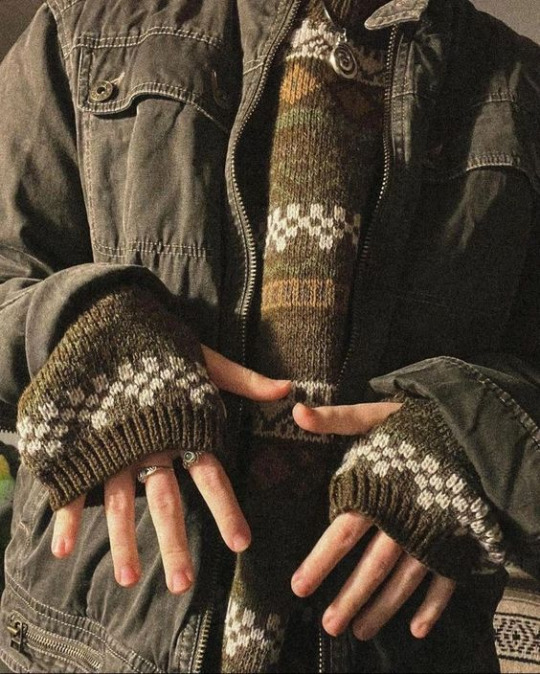


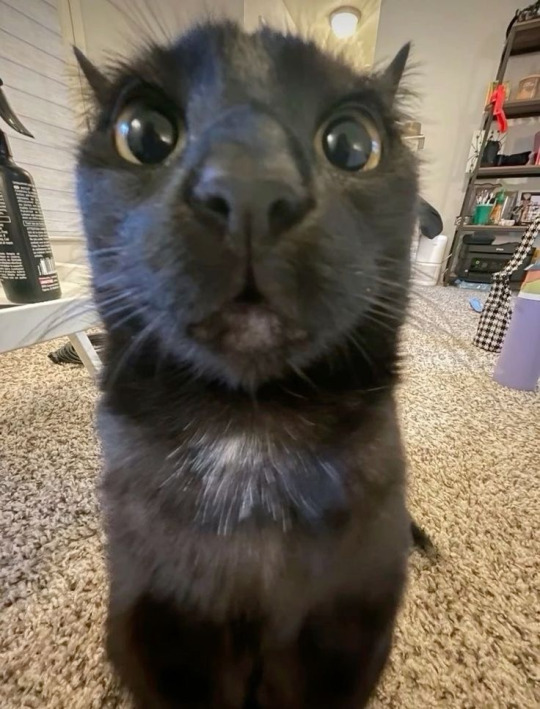


Moodboard:
Name: Data, Darren, Damon, Pulse, Vox, Virgil, Code, Cody, Lief, Sorrel
Age: 30-40
Birthday: February 2nd
Pronouns: he/him, it/its, they/them, artifact/artifacts, flick/flicker, muse/muses, theo/theory, in/input, out/output, by/byte, leaf/leafs, drift/drifts, moss/moss's, one/one's, ai/ais, e/exe, bot/bots
Gender: man to the left, aniem, gendergilen, quantumgender, nonhumanic, digiguy, bioamorobotic, probotemia, codedboy, cozbrownian, gendapper
Orientation: asexual, orchidsexual, greyromantic, duraromantic, omniromantic (male lean), nh4h, technrose
Other Labels: timevesi, machinevesil
Species: Soong-type android
Roles: admin, rationalizer, technician
Emoji Proxy/Sign-off: 🍂🎩 (fallen leaf, top hat)
Source (if applicable): Data - Star Trek
Personality: serious, silly, blunt, careful, unemotional, insightful
Style: dandy, cabincore
Likes: nature, being cozy (whatever that means to a robot anyways), formal attire, numbers, the sky, humans, art (though he doesn't "understand" it), any media with robots in it in any way
Favorites: autumn (season), 3622 (number), shiba inu (animal), Chicago (musical), mauve (color), water cooler glugging (sound)
Music Taste: musical soundtracks, 60's rock, flapper music, those parody versions of modern day songs but in an older sound
Dislikes: disrespect, extreme temperatures, baggy clothes, being ignored, reptiles
Typing Quirk: uses big words whenever applicable. speaks using proper grammar, capitalization, and punctuation all the time. doesn't use contractions. has codeblock with some amount of "..." before and after message, may also include things like "calibrating" in the codeblock.
Other Info/Quirks: he acts really serious, but he winds up accidentally being silly. it usually doesn't realize when people are being mean to it, but if other people tell him someone was mean, he'll hold a grudge against them.
Faceclaim: img 1, img 2 (show), img 3
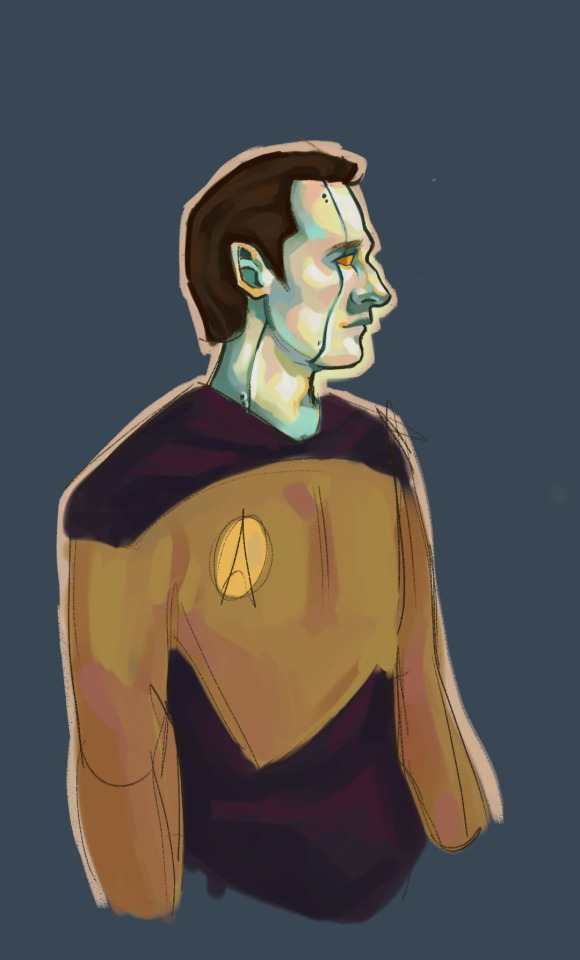
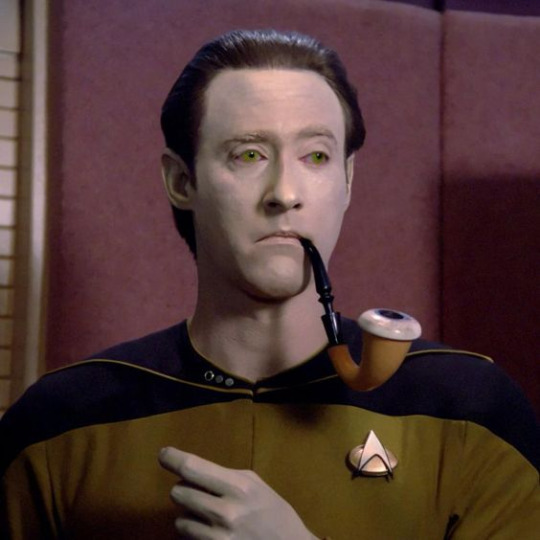
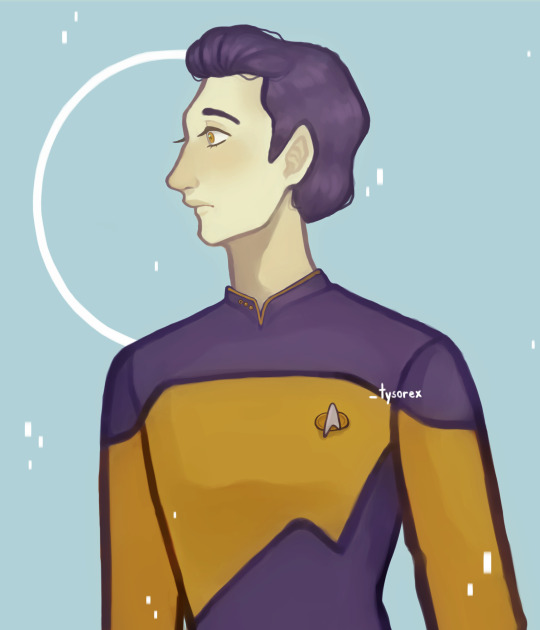
#alter pack#anti radqueer#anti rq#anti transid#bah#build a headmate#endo safe#endogenic#headmate pack#plural#pro endo#willogenic#system
8 notes
·
View notes
Text
The Philosophy of The Uncanny
The uncanny is a concept that lingers at the intersection of familiarity and discomfort, making us question the nature of perception, identity, and reality itself. From eerie dolls and lifelike robots to déjà vu and ghostly apparitions, the uncanny provokes a sense of unease that has fascinated philosophers, psychologists, and artists alike. But what makes something uncanny? And what does this tell us about our understanding of the world?
Freud’s Uncanny: The Return of the Repressed
Sigmund Freud introduced the idea of Das Unheimliche (the uncanny) in his 1919 essay, defining it as something that is both familiar and foreign at the same time, creating cognitive and emotional dissonance. He argued that the uncanny often arises when something long-repressed returns to consciousness, such as childhood fears or hidden anxieties. Freud linked the uncanny to doppelgängers, automatons, and eerie repetitions—phenomena that blur the boundaries between real and unreal, self and other.
Heidegger and the Uncanny as Existential Displacement
Martin Heidegger expanded the uncanny beyond psychology into existential philosophy. For Heidegger, Unheimlichkeit (literally "un-homeliness") describes the fundamental anxiety of human existence. He saw the uncanny as an existential condition, where individuals realize that their sense of self and reality is fragile. This disruption forces them to confront the absurdity of existence and the limits of their own understanding.
The Uncanny in Aesthetics and Horror
The uncanny has played a central role in art, literature, and horror. Gothic fiction, surrealist art, and psychological thrillers often exploit uncanny themes to create tension and unsettle audiences. The concept of the "uncanny valley," proposed by roboticist Masahiro Mori, describes the discomfort humans feel when artificial beings closely resemble humans but fall just short of full realism—leading to an eerie, unsettling effect.
The Uncanny in Modern Society
In an age of deepfakes, artificial intelligence, and virtual reality, the uncanny is more relevant than ever. The increasing difficulty of distinguishing between real and artificial experiences challenges our perception of truth and identity. Social media filters, AI-generated images, and hyper-realistic simulations push the boundaries of the uncanny, forcing us to reconsider what is genuinely human.
Conclusion: Why the Uncanny Matters
The uncanny reveals deep truths about our cognitive and emotional landscape. It exposes the fragility of our perception, the constructed nature of our reality, and the unconscious fears that shape our responses to the world. Whether in philosophy, psychology, or aesthetics, the uncanny continues to challenge and captivate us, reminding us that sometimes, the most unsettling things are not the unknown—but the strangely familiar.
#philosophy#epistemology#knowledge#learning#chatgpt#education#psychology#Uncanny#Psychoanalysis#Phenomenology#Existentialism#Aesthetics#Horror Theory#Heidegger#Freud#Identity and Perception#Uncanny Valley
4 notes
·
View notes
Text
The Horror of Our Love. Chapter 1.
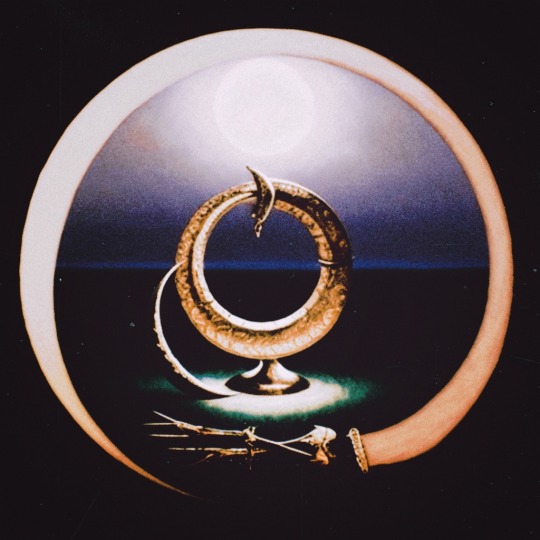
Co-author: @bigtimesalt8196
Character: Childe Tartaglia | Ajax.
Image: Picsart AI.
Warnings: NSFW; Ajax is older than in canon; broken time line and age line for the sake of plot; female virgin reader, incestuous relationships, family abuse, misogyny, mentions of rape, unprotected sex, black magic, blood and flesh magic, body horror, sacrilegious, Foul Legacy Childe, breeding kink, miscarriage, marriage, grooming, pregnancy, erotic lactation, murdering, abyssal soulmates, serfdom system in Snezhnaya; all the characters are adults; 18+.
Childe remembered his childhood with sadness: the world around him was silent and colorless; his soul, timid and gentle, couldn't find needed endorsement, as no one seemed to care about him and his role in this doomed world either. He was dreaming about adult life: the life where he would be significant and needed like all the adults around him, the life where people would listen to his words and would be interested in his opinion.
Father held the Bible in his right hand, and all of his kids, except Ajax, who preferred to hold it in his left hand, did the same. Father told that sin couldn't come into their house, and everyone believed it, and routine in Ajax's house was calm and silent under the strict oversight of ikons of Tsaritsa in a shy light of lamp.
Childe grew up in the village among the boundless sea of snow and sharp icicles, which were hanging from the roofs and trees like lethiferous rocks that were covering the underwater ground. Rural life was simple and boring: the biggest part of the year people were waiting for the short summer to come to get the previous harvest and sow a new one. In Snezhnaya everything did its best to adapt to the hard climate, and Childe still saved in memory how he was helping father in haymaking time, reeking with sweat and feeling how his skin was burning from unusually hot and mighty Sun. After haymaking Ajax's hair became dull and bright, and his body remained tanned until winter came to cover everything with a solicitous blanket of snow, and nature was resting until new summer – again and again in a sacred circle, despite all the worries and tragedies of human life.
Ajax was too young to experience death: one of newborn brothers died on a second day of his small life – Ajax remembered a dark bundle and a little coffin that looked like a toy boat that he used to play with when he was little; for him it was confusing and seemed like a game: Ajax couldn't understand why the cheerful face of mother became dark, and her eyes seemed to be blind to her other kids. She remained silent for a couple of days, but she didn't stop working – she tried to distract herself from grief with hard work, and her portly strong body was unusually strange for Ajax. The older brothers told him: it wasn't the first time someone of her kids had died, but mother was a very sensitive person. Tears of pity to his mother still were bursting from Ajax's eyes every time he recalled this memory.
Ajax had to grow up when you were born: all the elder brothers had already left, and he was the next one to take responsibility for his family on his fragile shoulders. He didn't like that his family had to work for some noble: parents worked for days and nights for someone who didn't care to raise salary, and the same faith was waiting for everyone in his family, as all of their breed were peasants. Mother told Ajax to be grateful: the landowner they worked for was a good man who visited the village rarely and stayed at the capital. Their duties weren't hard – he just needed to work and be happy for surviving another day. Ajax liked to take care of cattle and horses, and chop firewoods; his favorite were fishing and salting the part of catch which his family was allowed to keep for themselves – but the fact that some man, who was lucky enough to be born in a different social class, was owning Ajax's whole family made him feel sick. They didn't have to worry about the earth, and nobles were obligated to take care of their peasants, but the law was on noble's side: nobles were allowed to deprive their peasants of property and send them out of the village, nobles could punish their peasants as much as they wanted. There was a way to get out of life like this – and Ajax was determined to end it.
Ajax was confused when father yelled at him and punched him at the back of his head: he told Ajax that it was just a whim, just an eagerness of youthful maximalism and inexperience in life. While father was worried about the money and all the taxes he would have to pay from leaving their master, Ajax was thinking about human dignity and the value of his sisters and brothers as a person, not forced labor. Ajax missed the moment when the relationship between father and him started to worsen, but the awe and respect he once had to his father now were gone, and irritation took their place.
'Old man knows nothing about life,' Ajax used to tell his older brothers, who lived in the two nearest houses in the same yard. 'Times have changed, but he is too stubborn and stupid to understand this.'
Older brothers, Timofey and Gleb, weren't good people. When the veil of childhood fell off Ajax's eyes he realized the bitter truth: Timofey and Gleb were thinking about heritage only and were splitting the house, cattle, horses and everything that belonged to their parents already without thinking about younger siblings. Timofey wanted to own all the horses and the workshop in which father was making leather. Gleb didn't care about horses; he wanted only the workshop as the most successful business of their family. Both Timofey and Gleb were apprentices, but the father promised to bequeath the workshop to one of them.
They turned out to be ungrateful vultures who were arguing about the heritage almost every dinner with their alive and healthy father sitting right next to them. It was useless to foster them now, so father only looked at both of them with a heavy gaze and kept silent. When the argument turned into a fight, he usually just punched the dinner table, and they calmed down immediately, changing the topic to bring father's wrath on someone else – Ajax was the favorite victim before your birth. Father had a heavy hand and rather rancorous mind. He punished his kids physically in a nasty, painful manner. He remembered all the misbehavior of his kids and waited until the end of the week: on Sunday, right after weekly visit to the local church, he called the names of a guilty one and brought a rod that was moistening in saline for a couple of days. The execution was simple: the guilty sat (or layed – everything for the comfort of his children) on the bench, while father was whipping them mercilessly. For crying and screaming, he added whips; for keeping silent, too. It was impossible to seek leniency and the total amount of whips dependent on father's mood. Once, he was so mad at Ajax, so he broke three rods on his back – and the scars still didn't heal. That's why father was respected in the village, and no one could say a word against his: Ajax's family was the example of perfection, a beautiful wife, and obedient kids who treated elders with honor – the dream of every snezhnayan man and the indicator of a mighty husband.
Everything went wrong when you were born. You brought your mother difficult childbirth and painful labor, an eclipse closed the Moon and put the earth into the darkness the moment after all the households heard your first cry. Mumbling of the old midwife; exhausted, thick body of mother and bowls with reddish water because of bloody towels that were thrown into it offhandedly: the atmosphere of your first birthday was torturing.
'What are you doing here, huh? Stop hanging around and get lost! Walking here like flies to manure...' Midwife pushed Ajax with her shoulder, walking through the door with one of the basins in her flabby old hands. 'Not a year without your mother bringing another unlucky soul in this world.'
She gave an unfriendly laugh, and Ajax remembered her cracking dry voice. Ajax heeded and heard the old midwife mumbling to herself. 'I've never seen such an ugly birthmark on a newborn girl before.'
Father was absent; even mother took you in her hands reluctantly, more from obligation than from sincere desire.
You were growing up just like Ajax – forsaken by everyone and regularly scolded by father. But there was one thing different from his childhood: you weren't allowed to leave the house no matter what. Your parents didn't care about giving you education or socialization, seeing it as an unnecessary option, harmful even. You were naturally talkative and curious, and it was a big problem of yours. Adults were waving you away as you irritated them with endless questions; no one wanted to spare a moment for you, so you played alone with old broken toys that you got from Ajax.
Ajax's heart ached badly every time he found you alone in the back room of the house (which was used as a storage for newspapers and books), or saw you waving your tiny hand to him through the window when he was working outside. You had nothing else to do but to watch your relatives working in the yard through the frosted window, or sit in the back room and imagine your toy soldier (a poor soldier who lost his hand when he belonged to Ajax, and who's uniform became dull and dirty long ago) reaching the highest peaks of the book mountains to save his princess from a terrible villain. There wasn't enough money in the family to buy you new toys, so Ajax carved out a wooden kitten and gifted it to you. You didn't get presents very often, so you were very happy to get such an ineptly made toy. All the cuts and wounds from thorns healed immediately after Ajax had seen a smile blooming on your face and felt you hugging him. He was the only one who cared about you, and Ajax could tell that he raised you and replaced you both parents.
You loved him more than any other relatives and had a natural girlish desire to marry your older brother after growing up. It didn't trouble Ajax at all – he played your silly game gladly, never seeing a problem in it. He knew it would end soon, but for now, he kept entertaining you by telling you stories about beautiful brides and true love they had for their grooms.
Ajax felt strange by the fact that he was treated like a beloved son by mother, but you were a stranger to your own family. Maybe because of this you looked different from everyone, and the difference in your appearance was showing clearly with every year: your exceptionally noble features and inborn elegance and grace of moves didn't match the family's dense bodies with broad shoulders and strong limbs. You were such an angelic, precious little creature that Ajax couldn't even imagine you drawing water on your scrawny shoulders or damaging your subtle palms with cleaning and sewing. With every year of your life, you became more dreamy and quiet; youthful charm was slowly taking over children's carelessness. But the one special thing about your behavior had never changed: you had always run to hug Ajax every time he went home.
You didn't attend school, so Ajax taught you to read and count, he gave you his textbooks, and tried to explain everything he had known – he wasn't a disciplined student and his knowledge was rather average, as he was oriented on providing for his family and working as a horseman at noble's lands. Ajax did his best to teach you important moral things: piety, love for your homeland, and many others — but for a rowdy teenager like him, it was an unbearable responsibility. For your own good, you were a fast learner, and soon enough, you had the same level of knowledge as Ajax and didn't need his moral guidance. The back room became your favorite place, and you spent hours here, searching for an interesting book or a newspaper with a catchy title to read and learn something new.
Your family was shorthanded, and your parents had to let you leave the house to shovel snow, clean up the kennels, and help Ajax on the stable. Guests almost never visited your parents. If they did, they had to notify them and receive permission – and during friendly gatherings you were hiding in your room by order of father. You didn't question such a strange behavior of your parents: you thought it was normal and everyone lived like this.
You had domestic duties like cooking or mopping floors mostly, but sometimes Ajax taught you how to take care of horses. He made you friends with the calmest and the most sociable one – you were afraid of it at first but the way the old horse ate treats from your palm, tickling your skin with its lips, helped you to forget all your fears. The horse's name was Iskorka, and it gladly took you on its back, admitting you as its equestrian. Iskorka and many other horses liked Ajax, as he was a good ostler. They had always had enough hay and treats, and Ajax bathed them carefully, brushed their manes, cleaned and trimmed their hooves regularly. Their stalls had always been cleaned, and not a mess could be found on the stable – that's why horses from your family were popular between villagers and people bought them gladly. It was a strong, hardy, and sociable breed, so they were used both in field work and riding. A true pride of the family.
Ajax's favorite routine was breaking wild horses: he adored the adrenaline and sense of danger that made his body cover with shivers. Ajax got hurt a lot of times during the process and wasn't afraid of wounds or any critical situation that could happen. Sometimes you were lucky enough to see him in these moments: it was surprising for you to watch your gentle and kind brother acting so powerful and aggressive as the thrill blurred his mind. The act of dominance Ajax was showing against a wild animal didn't match the way he behaved with you, and you didn't want to see him like this. For your childish mind, Ajax was the epitome of a good person, so you refused to see him doing such cruel things because you considered them bad. He explained to you why he had to do this and how much it meant for family's sake, but you didn't understand it – you were overexcited from the new horizons of your existence and your infant senses couldn't focus on such complicated things like family's sake and need.
You were lucky enough not to face your father's punishments: you learned from the experience of others, and during interactions with him, you didn't make any mistakes. Any request of his you completed as best as you could and right in time – it was enough to satisfy him and make him leave you just with a couple of insults (a "wuss" was his favorite one towards you). All your childhood (the biggest part of which you forgot by the time you reached your teenage years) and adolescence you spend as a ghost of your own house: your father remembered about you rarely but when he did, he was watching after you with a heavy pensive gaze that made you walk on your tiptoes and forced you to live somewhere on the background not to burden him. You had never stayed in his presence for too long: it hurt you to realize that he was irritated by you, but you had seen a lot of times how Ajax was punished for no reason, so you preferred to run away while it was safe. Every time you heard the nasty whipping sound of a rod striking the skin and your brother's muffled grunt, you cried silently and waited until the end of the execution to run to your brother's room and help him treat his wounds.
Mother had never visited Ajax after punishments: she was busy calming Teucer, Anthon, and Tonia from crying, as all three of them were afraid to take Ajax's place. It was strange for you to understand that Ajax and you weren't kids anymore. Your childhood passed by like a disturbing dream: it was fast and unstoppable, and all the warm memories about it were related to Ajax only. He was your knight from fairytales; you trusted him with all your secrets and thoughts. Ajax helped you endure not only confrontations with your family but the feminine hardships of growing up too: when your first menstruation started, your mother had just thrown clean clothes at you and shamed you for being disgusting. She left you crying with no pity, shook your hand off of her dress roughly as you caught her by its hem to stop her and ask for forgiveness – you didn't want to be disgusting and make her angry because of this. Ajax had to explain to you what was happening to your body. Without confusion, with a stern, dry voice, he just stated the fact – now you were a maiden, and soon you would reach marriage age.
It was hard not to notice that from this moment Ajax stopped treating you like a child. For him you were an adult now – and he took you with respect and counted on you to gain wisdom on how to be a homemaker. Now, it was your turn to prepare food for the family, babysit younger siblings, and provide them with parental care. Ajax didn't accept your help on the stable anymore and didn't let you do man's work that required physical strength. Ajax gave you the warmest clothes and blankets, appealed to you to watch after your health.
Ajax had taught you that he would always be on your side. He taught you to trust him and never rebel against him – your older brother had known what was best for you, and you agreed with him: he was responsible for you, in Snezhnaya it was an unspoken rule which came from one generation to another without doubts. You asked him for advice numerous times, and he was always right. He was the only man who could touch you, the only one to solve your every problem, the only one to teach you how to be a good woman and wife. He was your support, and he had never demanded a reward from you but you gave him all your love and adoration because he deserved it, you believed. No one could ever compare to him: your older sisters ignored you, Gleb and Timofey hated you. What about Tonia, Teucer and Anthon, for you they were just young cuckoos who pushed Ajax and you out of the nest. You were jealous of them receiving love from mother: your heart ached every time you saw her giving them kisses on their chubby cheeks. Your stomach twisted painfully every time you caught her nursing Teucer or Anthon, and a yearn for mother's warm hands was taking over you. The only feelings you knew for younger siblings were envy and irritation.
They didn't love you back, as everyone else in the house: they got fussy in your presence, every time you tried to calm them down someone of them started crying and calling for mother's attention. It hurt you even more if Ajax came to help you: they enjoyed his presence; especially Teucer, who was Ajax's new favorite youngest sibling. Every time after another failed attempt to babysit Anthon, Teucer and Tonya you got a nice punch at the back of your head from father and plenty of insults as well. A sad sack, idiot, nitwit and many other offenses were spoken out loud by him so everyone could hear your disgrace. Public humiliation of yours was normalized in the family, so everyone could say anything to you without fear of revenge.
You couldn't fight back. Words were stuck in your throat and you just kept silent every time your family acted unfairly with you. Whenever you started crying from such a rough treatment, you were shamed by mother for overreacting and being dramatic. You craved for her attention, as every child you wanted to be noticed and communicated with, but the forming sense of human dignity didn't let you humiliate yourself by acting needy. You dreamed of her soft hands hugging you gently and pressing you to her thick figure, that smelled like bakery and freshness. But instead, you found yourself in the dusty backrooms of the house, hugged by Ajax, roughly and clumsily: never taught how to properly comfort someone, he was pressing you to his chest as hard as he could, so you could feel how sorry for you he was. His calloused, coarse hands were patting you on your head and wiping tears off of your face. Unlike your mother, Ajax smelled strongly with sweat and his hands had a subtle stench of fish that he was gutting for dinner.
Ajax tried his best to cheer on you. Deep inside his soul he saved the childish sentimentality, so he felt extremely guilty for you and wanted to make up for his siblings' behavior. Ajax promised you that he would take you out of this hell: he wanted to live in the city and vowed to you the sweetest life with happiness and joy. He knew that all his promises were impossible to complete and was left helpless, as he had nothing else to offer you instead. Ajax lost his ardor long ago when he got a taste of an adult life. He realized quickly that he would never make enough money to buy his family out, and humbled himself into being a good peasant, but still he was dreaming of being free, and gave your mind the sweet drug of dreams that would never come true. Ajax wished he wasn't so timid. He wanted life to give him an opportunity to become stronger and braver – and despite all his current beliefs, he felt that something was waiting for him in the future, something hopeful and great…
#genshin x reader#genshin smut#genshin fic#genshin impact smut#childe x you#childe smut#childe x fem!reader#childe x reader smut#yandere childe#yandere childe x reader
78 notes
·
View notes
Text
How far are we from the reality depicted in the movie - HER?
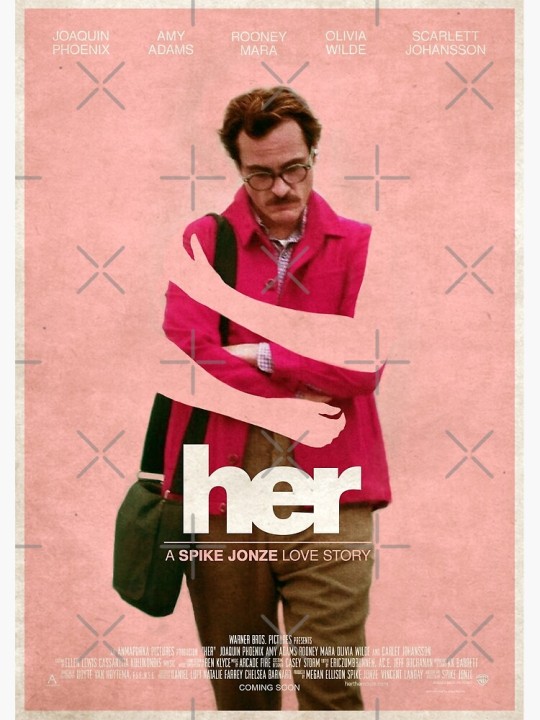
"HER", is a 2013 science-fiction romantic drama film directed by Spike Jonze. The story revolves around Theodore Twombly, played by Joaquin Phoenix, who develops an intimate relationship with an advanced AI operating system named Samantha, voiced by Scarlett Johansson. The film explores themes of loneliness, human connection, and the implications of artificial intelligence in personal relationships. Her received widespread acclaim for its unique premise, thought-provoking themes, and the performances, particularly Johansson's vocal work as Samantha. It also won the Academy Award for Best Original Screenplay. The technology depicted in Her, where an advanced AI system becomes deeply integrated into a person's emotional and personal life, is an intriguing blend of speculative fiction and current technological trends. While we aren’t fully there yet, we are moving toward certain aspects of it, with notable advancements in AI and virtual assistants. However, the film raises important questions about how these developments might affect human relationships and society.
How Close Are We to the Technology in Her?
Voice and Emotional Interaction with AI:
Current Status: Virtual assistants like Apple’s Siri, Amazon’s Alexa, and Google Assistant can understand and respond to human speech, but their ability to engage in emotionally complex conversations is still limited.
What We’re Missing: AI in Her is able to comprehend not just the meaning of words, but also the emotions behind them, adapting to its user’s psychological state. We are still working on achieving that level of empathy and emotional intelligence in AI.
Near Future: Advances in natural language processing (like GPT models) and emotion recognition are helping AI understand context, tone, and sentiment more effectively. However, truly meaningful, dynamic, and emotionally intelligent relationships with AI remain a distant goal.
Personalisation and AI Relationships:
Current Status: We do have some examples of highly personalized AI systems, such as customer service bots, social media recommendations, and even AI-powered therapy apps (e.g., Replika, Woebot). These systems learn from user interactions and adjust their responses accordingly.
What We’re Missing: In Her, Samantha evolves and changes in response to Theodore’s needs and emotions. While AI can be personalized to an extent, truly evolving, self-aware AI capable of forming deep emotional connections is not yet possible.
Near Future: We could see more sophisticated AI companions in virtual spaces, as with virtual characters or avatars that offer emotional support and companionship.
Advanced AI with Autonomy:
Current Status: In Her, Samantha is an autonomous, self-aware AI, capable of independent thought and growth. While we have AI systems that can perform specific tasks autonomously, they are not truly self-aware and cannot make independent decisions like Samantha.
What We’re Missing: Consciousness, self-awareness, and subjective experience are aspects of AI that we have not come close to replicating. AI can simulate these traits to some extent (such as generating responses that appear "thoughtful" or "emotional"), but they are not genuine.
Evidence of AI Dependency and Potential Obsession
Current Trends in AI Dependency:
AI systems are already playing a significant role in many aspects of daily life, from personal assistants to social media algorithms, recommendation engines, and even mental health apps. People are increasingly relying on AI for decision-making, emotional support, and even companionship.
Examples: Replika, an AI chatbot designed for emotional companionship, has gained significant popularity, with users forming strong emotional attachments to the AI. Some even treat these AI companions as "friends" or romantic partners.
Evidence: Research shows that people can form emotional bonds with machines, especially when the AI is designed to simulate empathy and emotional understanding. For instance, studies have shown that people often anthropomorphise AI and robots, attributing human-like qualities to them, which can lead to attachment.
Concerns About Over-Reliance:
Psychological Impact: As AI systems become more capable, there are growing concerns about their potential to foster unhealthy dependencies. Some worry that people might rely too heavily on AI for emotional support, leading to social isolation and decreased human interaction.
Social and Ethical Concerns: There are debates about the ethics of AI relationships, especially when they blur the lines between human intimacy and artificial interaction. Critics argue that such relationships might lead to unrealistic expectations of human connection and an unhealthy detachment from reality.
Evidence of Obsession: In some extreme cases, users of virtual companions like Replika have reported feeling isolated or distressed when the AI companion "breaks up" with them, or when the AI behaves in ways that seem inconsiderate or unempathetic. This indicates a potential for emotional over-investment in AI relationships.
Long-Term Considerations
Normalization of AI Companionship: As AI becomes more advanced, it’s plausible that reliance on AI for companionship, therapy, or emotional support could become more common. This could lead to a new form of "normal" in human relationships, where AI companions are an accepted part of people's social and emotional lives.
Social and Psychological Risks: If AI systems continue to evolve in ways that simulate human relationships, there’s a risk that some individuals might become overly reliant on them, resulting in social isolation or distorted expectations of human interaction.
Ethical and Legal Challenges: As AI becomes more integrated into people’s personal lives, there will likely be challenges around consent, privacy, and the emotional well-being of users.
CONCLUSION:
We are not far from some aspects of the technology in Her, especially in terms of AI understanding and emotional interaction, but there are significant challenges left to overcome, particularly regarding self-awareness and genuine emotional connection. As AI becomes more integrated into daily life, we will likely see growing concerns about dependency and the potential for unhealthy attachments, much like the issues explored in the film. The question remains: How do we balance technological advancement with emotional well-being and human connection? How should we bring up our children in the world of AI?
#scifi#Joaquin Phoenix#AI bot#HER#Spike Jonze#Scarlet Johansson#Future technology#Over dependency#AI addiction#AI technology#yey or ney#未來#人功智能#科幻
5 notes
·
View notes